#he has to focus on something else that puts the agency? blame? narrative? back on him
Explore tagged Tumblr posts
Text
This is just an unstructured, incoherent vent post, but I've seen a few posts recently about how Adrien would definitely forgive Marinette for keeping secrets from him because he loves her, or that he would blame himself for not noticing what was going on and not her. And those aren't wrong, per se, but this is what I mean by the show taking away Adrien's agency. Ultimately his choices are allowed only as far as they do not inconvenience Marinette or anyone else the narrative cares about, like Felix or Nathalie. Which is why Adrien is not allowed to grow, he is not allowed to prioritize his own feelings and emotional needs. Any wrong done to him is resolved by him putting aside his own feelings to forgive the people who wronged him. And yes, he has been taught that his feelings don't matter by Gabriel and that he should bend over to the whims of everybody around him. And that kind of makes it worse, how the effect of Gabriel's abuse is used to convenience everyone around him. I think it's gross.
Just look at the Ladynoir conflict from Season 4. Adrien brings up his grievances with Ladybug's treatment of him a few times, but ultimately, he ends up putting it aside to focus on her emotional needs when she is at her lowest. Kuro Neko gave us the message that it wasn't that Ladybug was treating Chat Noir unfairly, but that Chat Noir should stop expecting to be treated with respect and should stop having emotional needs. And at the end of Strikeback, nothing is resolved, Ladybug hasn't apologized to him or resolved to do better by him, but he still shows up to her side to comfort her. No, she didn't apologize to him. She admitted her mistakes but did little to correct them even after the fact. That whole arc ended with Chat Noir being treated poorly over and over, and yet coming back to Ladybug's side because he's such a good partner and he loves her so much.
And Adrien, a character who has been forced his whole life to bend to the whims of others to please them at his expense is doing the same thing to Ladybug. Adrien exhibiting this behavior is 100% a trauma response. Ladybug is supposed to be his escape from his abusive homelife. And yet, the show writes him falling back into his trauma responses with her (Kuro Neko) and does jack shit to portray it as a bad thing. And the Season 4 finale is once again Adrien putting aside his feelings and showing up to support her. Adrien's emotions are not validated, they are tossed aside. Ladybug admitted her mistakes as she did several times through Season 4, but she still did little to correct them. That admission in Strikeback doesn't do much, because we never see her do anything to fix her mistakes after that. What happened was that Chat Noir saw her in distress and decided his feelings were unimportant because she needed support.
This is not healthy. Adrien should not be invalidating his own feelings so that he can offer comfort to others. He shouldn't forget and forgive so quickly without the other person doing anything to correct their behavior towards him. Once again, this is how Gabriel has taught him to behave, to stop "being so emotional" and to conform to his expectations. And Adrien continuously downplays his own issues for others' sake. And obviously, we would understand that he can heal from this, that he can learn to take care of his own emotional needs first.
And quite frankly, all the posts about how we shouldn't want Adrien and Marinette to break up, or how we shouldn't be so hard on Marinette, or that she is just a child in tough situation, or that she is doing it out of love and that Adrien would forgive her kinda make my point. Because let's be real. What Marinette did is a serious breach of trust. I do not understand how anyone could forgive something like that quickly. And I understand why she did it. I don't think she is a bad person or anything like that. But it's still an awful thing to do. And frankly, I don't see how Adrien could just... instantaneously forgive her without invalidating and downplaying his own pain and hurt. If he did, I would seriously question his self-worth. And while I don't think Adrien would never forgive Marinette or that he would stop loving her, frankly, I would like to see more acknowledgement of his feelings and his emotional needs both from the fandom and the show. I would like to see that his feelings matter, that he is allowed to be angry and that he is allowed to hold people accountable and call them out. I would like for him to not forgive some people. I would like for him to require distance and space from them. That would be development for Adrien, to let himself be emotional and not feel the need to put his own needs aside for others.
But for Adrien to prioritize himself, it would mean acknowledging the harmful things characters like Marinette have done to him. And that can't happen, because all the purpose Adrien serves is as a plot device to connect Marinette to Gabriel, and actually having her be held accountable by the narrative for her choices is a big no no. Growth for Adrien would mean that he lets himself be angry at Marinette for how she kept secrets from him, never apologized for it, and ultimately ended up keeping the greatest secret of all from him about his father and the fact that he is a Sentimonster. But as the writing to this point shows, Marinette isn't a safe space for him where he is allowed to be himself. She is someone who also elicits his trauma responses from him. He doesn't let himself be angry with her, he always puts himself last when it comes to her.
I am not saying Marinette is in any way comparable to Gabriel. She is nowhere as bad as him, she does not come close to that in any way. Marinette is a good person. But what she did in the finale, is explicitly something that Gabriel wanted her to do. Gabriel wanted to continue to dictate his son's emotions and perceptions, and Marinette helped him do it. That's not a healthy relationship. And looking at all the Marinette-Gabriel parallels in Season 5... it's not a good look at all. The show portrays Adrien as someone who has been denied autonomy his whole life, and as someone who is expected to cater to the desires of the people around him and be perfect for them while neglecting his emotional needs, and made his arc one of finding independence and his own identity and learning that his feelings and desires matter. But also, they only matter as far as they don't inconvenience Marinette. Adrien shouldn't downplay his feelings, but if doing so would help Marinette, then he should do it actually. And it's hard for me not to see it as Ladybug benefitting from his trauma from his abusive home. It sounds harsh, but that's how it feels.
And all the talk of how Adrien would never hate Marinette and that he would forgive her is... disappointing to me. Because I don't necessarily disagree, but it still is about prioritizing Marinette's feelings over Adrien's. What is focused on is not how Adrien might feel betrayed, but how Marinette might feel sad about Adrien feeling betrayed by her, and reinforces that Adrien is so good because he would not hold it against her. Even though he should, even though it means he would be downplaying his pain massively if he didn't blame her for that. If Adrien's character should develop, he should be allowed to realize that he has the right to get angry and that he doesn't have to downplay his emotions or feel like it's all his fault. He should be allowed to do that without people jumping to Marinette's defense and excusing her of blame.
Throughout the series, Adrien has been the person to help Ladybug through her problems, and the narrative has never allowed her to do the same for him. And I want to see focus on Adrien for a change. I want to see someone other than Plagg reassuring him and supporting him, especially his partner. I want to see the narrative be less about "oh, Adrien would never hold anything against Marinette because he loves her and would understand her always," and be more "actually Adrien is allowed to prioritize his feelings and want distance from Marinette after she betrayed him in such a personal way." That would be development. That would be reclaiming his agency. That would be free will and autonomy. I would like to see focus on this in the show and the fandom.
Adrien is not obligated to forgive Marinette. He is not obligated to understand her reasonings for why she did what she did. He is allowed to be angry at her and express his hurt because of her actions. Seasons 4 and 5 have regrettably established Marinette as someone else who denies Adrien's agency and around whom he reverts back to his fawning trauma response, and quite frankly the best thing for him to do would be to break up with her and go find himself on his own terms. I want his character to develop and grow, and unfortunately, Seasons 4 and 5 proved to me that it would not be possible as long as he is around Marinette, both from a character and narrative standpoint.
I just wish people would acknowledge and validate Adrien's perspective and feelings more. Even if it means calling out Marinette. Gabe is Adrien's abuser but he isn't the only one who has hurt Adrien in the story. Marinette is an incredible and amazing person but as far as we've reached in the show, she is hurting Adrien. And she has done many things across these two seasons that violate Adrien's trust. It's not even that this is a mistake she could learn from, but that she has done several such things over and over. From keeping secrets about the Miraculous holders' identities even though Hawkmoth himself knew, to Rena Furtive, to trying to trick him into an identity reveal in Ephemeral, and now keeping the fact that he is a Sentimonster and that Gabe is Monarch from him. It's gone from secret keeping to outright lying to him. It is not healthy. And it is a sign of stagnation and regression in Adrien's growth if he continues to keep forgiving her over and over again despite her never fixing her behavior.
If Adrien's arc is about finding autonomy, then he cannot be with someone who is complicit in denying him the ability to make his own choices. If Marinette was supposed to be the knight in shining armor, they shouldn't have given her the key to the tower and have her hide it away. If she was supposed to save him, they shouldn't have had her condemn him further. If Marinette was supposed to be the one who helped Adrien regain his self worth, the person whom he could trust and rely on the most, they shouldn't have made her side with Gabe, deny Adrien his agency, and violate his trust so many times.
It didn't have to be written this way, but these were the decisions made by the writers. They chose to portray Marinette like this for no discernable reason and refused to acknowledge it or deal with it meaningfully. Adrienette is so profoundly unhealthy now that if Adrien's character is to grow, the only way for him to do that is to break up with Marinette. But the show has also made it very clear that Adrien is only a plot device and a trophy for Marinette at the end. So I have no doubt that all will be forgiven in a matter of minutes, and the narrative will praise Adrien for being traumatized and denying his own emotional needs to comfort Marinette as she feels bad for hurting him. And it's sad, but I guess it is what it is.
#MLB#Meta#My meta#S5 Finale#ML Salt#ML Writing Salt#ML Fandom Salt#Marinette Salt#Not really but tagging to be safe#Ladynoir conflict
390 notes
·
View notes
Text

Bungo Stray Dogs - Kafka Asagiri/Sango Harukawa Vol. 11-12: Dazai and The Nurse - A Commentary (*anime spoilers and manga spoilers up to ch.114)
-i do like lucy
-oi oi oi, "there's a way to transfer skills between bodies" and a "skill user who manipulates shadows" knows how to do it? oi, wait.
-oh right, what's grape of wrath doing these days i wonder. in manga real-time these things take place in a short time span, but irl time it feels like ages
-oh yes, poe isn't with the guild anymore.
-atsushi is so sweet and kind and empathetic, but he has NO CHILL, i love that about him
-i want to grab your little hand and squeeze it, dazai-chan
-ah yes. this is where dazai gets shot and this is where i started fuming in the anime season. I AM SO ANGRY AT THIS EVENT! which is a good thing for the narrative, but I AM SO ANGRY! WE DO NOT INJURE DAZAI! HE'S THE *ONE* MAN THAT WE CAN'T FIX, WE DO NOT INJURE DAZAI, WE DO NOT-
-something i've noticed btw, and i think it might be due to the nature of the anime vs the manga timeline and arguably can't be helped, is that the suicidal-maniac part of dazai is much more sparse in the manga. in the anime, it feels like he mentions it way more often.
-you know what kind of antagonist dazai needs -and ranpo, and mori for that matter- after we're done with fyodor? someone genuinely layperson and chaotic. someone who doesn't think 500 steps ahead, someone who acts completely on a whim and has no attachments or lofty goals, someone so random that they simply cannot read them because the possibilities are endless. i'm talking csm denji times one thousand.
-and we still don't know fyodor's actual goal after eliminating the skill users and getting the book. we know fukuchi's plan, but that's not all, surely. we're so not done with this bitch yet.
-i miss hearing their voices. the anime made me more excited to read the manga, the manga's making me more excited to rewatch the anime, and both are making me more excited to get to the spin-offs and such, this is great.
-fukuzawa, i need you to remember that your black sheep son willingly got himself shot to glean information for your agency's sake. alright? I NEED YOU TO REMEMBER THAT, FUKUZAWA! *shakes fist*
-what does "a world free of sin" even mean, fyodor, what do you want! free of skill users is obvious, but sin? are we talking brainwashing, kira cult, what are we talking about?
-atsushi destroyed his clothes before we've even gotten into the story of v12, he had a head start beginning from the cover smh
-ranpo is devastated with fukuzawa in the hospital, my heart. no offense, but fucking fyodor traumatized me in this arc, what with dazai being shot and the whole fukuzawa-mori thing and how it destroyed everyone. you can't blame me that it took a long long while for me to go from "i hate this guy" to "i hate this guy but in a good way."
-SAY IT ALOUD, KUNIKIDA-SAN, REMIND EVERYONE HOW DAZAI IS PART OF THE AGENCY, DAMN!
-this is so clearly a "we really can't have dazai around for this or else the conflict will be over in two minutes" injury.
-dude, atsushi doesn't open doors, he slams doors open, habitually
-CHUUYA IS SO PRETTY
-the way that women aren't sexualized.
-chuuya i want to pinch your little chiwawa cheeks you're so pretty
-on the one hand, the manga story is 100% streamlined compared to the anime, where sometimes i had Thoughts on the plot/focus of the story. on the other hand, i wonder, if i DIDN'T know what backstory i know because of the anime, if i were manga-only, would i feel the lack of something that i couldn't pinpoint, or would i get the same enjoyment even without it?
-okay but WHO are "the rats in the house of the dead," HAVE WE MET THEM
-seriously, no one jumps to "i'll kill" as fast as tanizaki, just lend him to the port mafia and let him have his semi-dark arc. he's so cool when he's being lethal. give him his questionable era, his moment to shine.
-wth is that grin when you're fighting kyouka, aku-kun, put that back where it came from
-IT IS SUCH A BIG MOMENT when aku-kun tells kyouka that he's glad for her that she doesn't yearn death anymore :')
-is it just me or is mori prettier in the manga than in the anime? fukuzawa too, for that matter.
-oh, dazai's clenching his fist when he says "if it weren't for my nullifying skill, i could've had yosano-sensei heal me and join in, but..." oh my heart, he truly wants to be with them. there’s no other reason to express this thought in this kind of visual than to show genuine emotion
-i love dazai so much though :')
-THE FUCK DID YOU DO WITH THAT NURSE, DAZAI?! not fucked her surely, you're injured, but THE FUCK DID YOU DO WITH THE NURSE THAT MADE YOU A '-SAMA'?! tbf, knowing dazai, it's just as likely if not more than likely that he played therapist for her or something. 'cause this is the third time a "woman misunderstanding" is happening in the manga. first you think he's flirting with higuchi, but no actually, he's bugging her. then you think he had sex with kouyou, but no actually, he just talked to her. so it's quite possible that it's a case of "you think he fucked the nurse, but actually he just lent her a shoulder to cry on." and off-manga timeline, at least in the anime, the same thing happened with sasaki, it was all "dazai did WHAT with sasaki?" and the answer was "in fact, he did absolutely nothing." i find it funny that THIS, of all things, is one of bsd's great unanswered questions though, and that there is canonical events that could very well support the "actually no, it wasn't sexual" to what looks like a sexual gag. you could argue that the manga makes a point of pointing out that even though sexual advances for personal gain would be expected from someone like dazai, it is in fact not something that dazai does (and no, chuuya’s “womanizer” comment from when he knew dazai four years ago doesn’t count). although. if we were ever given an answer, i believe it would be far sillier than anything we could imagine. like, they sing karaoke, or he shares his medicine with her and she gets high, he shows her how to beat that really hard mobile game, something utterly, completely stupid.
-fukuzawa/mori vs dazai/chuuya vs atsushi/akutagawa battle, who wins, go! i say dazai/chuuya.
-chonky natsume cat is chonky
-fukuzawa's "child of my own to take care of" is ranpo, isn’t it? IT IS, THAT’S SO CUTE
-okay, but now having read a bit more about the real oogai mori and vita sexualis i want to know more about mori-san’s skill. is elise the general concept of a cute and spoiled childhood that he himself didn’t have, is he projecting sexual desires that he won’t act on through elise, is this the childhood he wanted as in he wanted to be elise, what is it, let’s talk.
#bungo stray dogs#bungou stray dogs#bungo stray dogs manga#manga commentary#ahahaha i had so much to say about dazai and the nurse why#i get more obnoxious in vol.13#twenty pages in i'd already written an essay
1 note
·
View note
Text
us on tumblr like: the most important thing actually is that daniel did nothing wrong in the karate kid part three and he needs to stop framing it to himself and others as if he did
#daniel larusso#tkk3#terry silver#the karate kid part three#daniel babe you were a good boy who was hurt by a bad man that's not on you#i feel like one could do some deep meta on the way he hyperfocuses on the bit where he punched the (paid) harasser#because clearly that Lingered WAY past what it truly was - daniel you punched a guy once for being a creep#and then immediately felt so bad about it that you called hospitals to try to apologise#i wonder though if it hasn't grown in his head - in the absence of being able to directly face what DID happen#he has to focus on something else that puts the agency? blame? narrative? back on him#so instead of what it is: an extended harassment campaign and two grown men manipulating you into hurting YOURSELF#before violently revealing themselves and THEN hurting you again in front of a cheering crowd#(and the mixed feelings of *i love miyagi my father and i cant bear to think that i might have felt let down ever by him*)#it's stripped of the things that were done To Him and instead make him complicit#so when he looks back at tkk3 he doesn't see his own bruises and blood - he only sees this random guy#me cheering that he got to say *you tortured me* to silver because that was more admission than i was expecting#(this is purely holmesian analysis im not speculating on intentionality - im just emotional#man tkk3 is such a dark movie fckn#how many times does daniel get physically hurt in that film???
53 notes
·
View notes
Photo



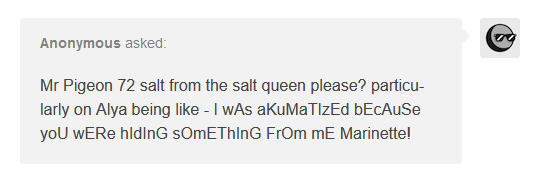

where do i even begin
The focus in this episode is all over the place and also on none of the right things.
Let’s just start with the obvious: they didn’t even bother showing Alya's reaction to Marinette being Ladybug. We got nothing. Marinette revealing her identity to Alya is supposed to be a big deal, but the episode brushes it under the rug and even seems to lowkey blame Marinette for not telling Alya sooner, to the point where it outright lies and has Alya claim that Marinette’s secret was responsible for all of Alya’s Lady Wifi appearances.
It’s not like I’m surprised anymore when the show blames Marinette for like--anything, but the fact that this season seems to brag about its continuity by being on a firm timeline and then keeps going against continuity is really irritating.
And speaking of continuity, the Adrien pictures are back on the wall with absolutely no reason given. Narratively speaking, the show put them there so Alya would see them and think of bringing up Adrien to get Marinette to take a break, but the show can’t just do that if it wants to imply that it has continuity. Worse still is that this is the episode featuring “Charm Bug” (does her form have a name? I just call it Charm Bug and continue to do so), meaning that “Gang of Secrets” (where there were no Adrien pictures) has to take place before this and “Furious Fu” (where there are also no Adrien pictures) has to take place after.
At this point, they might as well just confirm that “destiny” is a real force and the ladybug miraculous is messing with Marinette’s room and twisting her emotions to make the love square endgame because--yeah, that’s all it is at this point.
The other thing is that Alya shoos Marinette away from her guardian duties so Marinette can go comfort Kagami (let’s be honest, the best part of the episode was Alya being like, “but what about Adrien?” and Marinette was basically like, “what about Adrien?”), which sounds great, but then it all goes back to Adrien, because of course it does.
Not only that, but the episode mocks Marinette for worrying about Kagami. Not only does Alya doubt Marinette’s concern, but Kagami isn’t at all affected by the break-up and isn’t even touched by Marinette’s worry.
The thing is, I get where Marinette’s coming from, because this is the Kagami who told Ladybug in “Heart Hunter” that she (Kagami) and Adrien were perfect for each other to the point where Kagami prioritized her potentially getting together with Adrien over her friendship with Marinette. Also keep in mind that Marinette is Kagami’s only friend, and it makes total sense that Marinette would expect Kagami to be devastated by the break-up.
But because it’s Miraculous, the show makes Marinette look like an idiot for being concerned for Kagami, as if saying, “Silly Marinette! Kagami’s not like you! Kagami is a strong independent woman!! You’re just so over-emotional and you were ridiculous for being sad about your own break-up! You should be more like her!”
I also don’t like it because it presents Kagami as this character who really does feel nothing due to the show not letting her. She was angry at Adrien, obviously, but she was also immensely upset and it made sense when she put so much effort in trying to get him to return her affections.
Buuuut no. Kagami is just annoyed by Marinette’s efforts to try and get her back together with Adrien (it’s not that her anger isn’t warranted, but that’s all they let her feel instead of any genuine sadness over the break-up).
And of course, there’s no mention about Marinette literally trying to help get Kagami back together with Adrien and how selfless that is on Marinette’s part. Obviously I don’t agree with Marinette disregarding Kagami’s feelings (I do hate though how the episode refused to have Kagami explain why Adrien upset her, which would help Marinette understand because she seems to think there’s a misunderstanding/Kagami doubting herself), but the episode refuses to acknowledge Marinette’s good intentions because it’s Marinette and because she’s supporting Adrimi and not the love square, so they’ll make her look as bad as possible. This led to the fandom talking about Marinette and her oBsEsSiOn with Adrien instead of saying UM HI YEAH MARINETTE IS DOING A “HEART HUNTER” 2.0??
(The show also does this consistently, by the way.)
Another thing the show won’t acknowledge is that what Marinette does with Kagami is extremely similar to what Alya does with Marinette. Alya has ignored Marinette’s agency, physically pushed her towards Adrien, and locked her in a room with Adrien no matter how many times Marinette has told her no and that she doesn’t want that.
But because it’s Marinette and because what she’s shipping is Adrimi (i.e: a ship that interferes with the love square), the episode absolutely tears her apart for it. If Alya’s meddling was treated the same way - where she’d be constantly put in the wrong and punished for it - I wouldn’t say a word about this, but we know that’s not the case from “Reflekdoll” (where Reflekta targeted Marinette and Rose of all people) and “The Puppeteer 2″ (hey, remember when Alya did all of that and then it was the museum staff who did nothing wrong who got the worst of Puppeteer’s wrath?).
And this isn’t even taking into consideration that, once again, Marinette has learned something from someone else because they were never called out or punished or learned (originally being Adrien/Bustier where she “learned” to trust Chloe and see where that got her???), and then she’s the one who gets the heat for it.
Might I also add how insulting it is that the episode before this had Marinette saying that she “didn’t want to focus on love,” and then immediately afterwards, Alya is pushing for Adrienette and the episode itself won’t let anyone shut up about Adrien?
Like, this is the episode where Marinette does guardian stuff, gets an upgrade in Charm Bug, and yet the episode hyperfocuses on Aaaaaadrien. He doesn’t even do anything; he’s just a black hole that inhales all available attention and magically pulls all the characters towards his general location.
Then the episode keeps breaking its own continuity as an excuse to make things more about Adrien and also more about the love square, like saying that Marinette carries her disguises everywhere when it’s really just an excuse for Marinette to conveniently have the umbrella so that they can recreate the umbrella scene (by the way, the line from Marinette about “recreating Kagami’s moment where she fell in love with Adrien” is both incredibly forced and incredibly obvious because we’ve never even seen how Kagami fell for Adrien).
And when you already know how the show goes, it all becomes so predictable, which is a huge problem. By the time you hear Marinette say that she “didn’t want to focus on love” last episode, you already know what’s going happen. This episode reaffirms Marinette’s crush on Adrien, which is weird because it’s not as if there was ever any doubt in the first place? The show didn’t even try to convince its audience that Marinette was actually trying to move on, which gives the scene no impact when it happens. We already know that Marinette isn’t really in denial (she’s not stupid) and is very likely saying that she’s not in love with Adrien because admitting it hasn’t gotten her anywhere and she’s repeating something to herself is an attempt to make it true (which is a common coping mechanism for people with self-esteem issues/anxiety), so the scene is just for shipping fuel.
We’ve seen future episodes that show that Marinette hasn’t made any actual progress, hence being another piece of evidence towards my theory that the show does it on purpose to get the Adrienette fans to freak out when anything happens even if it’s reversed in the end. It’s particularly frustrating because it denies Marinette of agency yet again, with her saying something and the show then going lol okay but what if--
It’s gross, and made more so by Kagami watching Marinette and Adrien from a distance and saying that they’re “made for each other.” I’ve talked many times before about how the show is too lazy to have actual chemistry between the love square so they’ll just have characters say that they’re meant to beeeeee, so I won’t go into that, but really, actually think about what Kagami’s saying here.
This is the guy that, in her eyes, abandoned her repeatedly on dates and lied in order to get away from her. She stated outright that Adrien had disappointed her to the point where all of her feelings for Adrien seemed to have completely disappeared and she didn’t even want to be friends with him anymore (at least for now).
Yet, the show had Kagami not only say that line, but told Marinette directly that Adrien was perfect for her. This means either one of two things, neither being good:
- the show intentionally had Marinette do all this so that Kagami would feel embarrassed for Adrien and thus fix all of Adrimi’s relationship problems without Adrien having to do any work to earn her trust back (notice how Adrien in this episode is an “extra good boy” this time around, probably even more than they usually try - keyword: try - to portray him)
- Kagami’s opinion on Adrien hasn’t changed at all and she’s essentially saying that Marinette belongs with this guy who has hurt Kagami, betrayed her trust, and will probably do the same to Marinette
And obviously the show doesn’t think about any of that. It just wants to push for the love square. The only reason there was any focus on Kagami at all was to have a reason to get Marinette to go to Kagami, for Kagami to get angry at Marinette because - as we all know - Marinette “has to mess up and learn in every episode,” so there’d be a reason to go to where Adrien was, and so Kagami could become the next local shipper for the love square.
Marinette didn’t even get to figure out the magical charms by herself; Rena Rouge gave her the answer. It was like the show saw her doing guardian work and shoved her out the door because the only thing she’s good for is being part of the love square. Alya gets seconds of time shown with her looking over the grimoire to figure out the trick, which makes the whole thing underwhelming and rushed when Rena comes up and tells Ladybug that it’s essentially “just been about her” the whole time, meaning it’s just the show yet again being like “see, Marinette? If you’d just figured this out bEfORe...” (note that the episode never tells Marinette that she’s unnecessarily guilting/blaming herself)
But yeah, despite the episode not giving Adrien anything to do, characters talk about him constantly, Marinette somehow doesn’t get the spotlight she needs despite getting a power-up form, and the episode feels the need to constantly railroad Marinette exactly where it wanted to go, not for her, but for the love square, which has always been about not her. It’s already bad when the episode itself is bad, but when it has so much to throw in and delivers on absolutely none of it, it just makes it all the more painful.
123 notes
·
View notes
Text
Why Jihyun is a horrible person vs Kyujin (used here as a comparison) - part 1
This is quite a long post, so be patient with me. Also, FULL SPOILERS.
I am here again to talk about Oryu’s manhwa “Back to School” (or “Returning Student”) and to mostly vent my thoughts about Jihyun and how he is depicted.
Now, I know many manga have interactions between characters that are seemingly violent/forceful, but the narrative of the story wants to depict them in a positive way. I don’t think this is the case. In this manhwa we have two “love interests”, one is Jihyun and one is Kyujin. And we can use both Kyujin’s behavior and Chiwoo’s reactions to see that the author intended to show that Jihyun is not a good person.
This long post has all the warnings, from threats, to gaslighting, to abuse and rape, please, be mindful and careful.
I will also use J and K instead of the full names, because I have terrible spelling! Remember, J is the bad one.
THE FIRST ENCOUNTER
J is reunited with Chiwoo in chapter 4. Up till now we know that J. is aware of the fact that Chiwoo changed school, moved away and purposefully did not tell him where. Part of him thinks it is because of the murder charge (and he believes Chiwoo thinks he is guilty), and this because he doesn’t seem to comprehend that Chiwoo might have agency or personal feelings about being subjected to sexual assault.
So, J knows Chiwoo has moved away (even remarks it, telling him not to run), and yet, his first reaction is hugging Chiwoo.
Chiwoo's reaction is this:

Anyone around them can see that Chiwoo is distressed, from a random professor, to K, who comes running. Yet, Chiwoo’s relationship with J has always been warped, and Chiwoo knows that J is more than able and willing to cause him trouble (example. beating up people who might show kindness to Chiwoo), so, with an absolutely HEARTBREAKINg look of resignation, Chiwoo tells everyone that it is okay, J is his friend.
J then proceeds to drag Chiwoo away and ignore about 5 or 6 “Stops”, before proceeding to kiss him. He lets go of him only when Chiwoo bites him and pushes him away. Chiwoo has to literally draw blood. And this is the reaction:

This is not surprise, this is panic (see the dizzy, and the feeling of throwing up).
And yet, even this time, J's concern is always for himself, as usual. His reaction is annoyance. After having dragged Chiwoo to a secluded place, kissed him against his will, admitted that he knew Chiwoo probably wants to run, his reaction is "I am about to get really pissed, how can you treat me like this?". J said sorry, he has said sorry so he expects Chiwoo to accept the apology and act naturally. And here, I think, there is the core of his character.

I don't think J ever thought Chiwoo was blameless. He is telling the truth here, he does think that Chiwoo's attempts to ignore his past "I like you" were the cause of his rapist behavior. Nothing clearer than some quite obvious victim blaming, here.
The interaction is interrupted only because J has to go, and you can see the way he positions his hand (on the side of Chiwoo's head) to trap him. Chiwoo is LITERALLY FROZEN IN FEAR. And from this point onward, he expresses both a dislike to being touched and an uneasy anxiety at the idea of going to school (when he finds out J joined his school).
This is how the author wants us to look at their first interaction in the comic. Absolute egoism, blindness, from J’s part, and frozen fear from Chiwoo’s part.
Ah yes, the good look of a love interest, trapping your terrified lover against a wall, and dismissing his fear at looking at you or being around you, because that is not important. J’s feelings, his need to be around Chiwoo is more important than anything Chiwoo might say or need.

FIRST KYUJIN PARENTHESIS
Now let's compare the interactions between Chiwoo and J, with what happens next with Chiwoo and K. We have seen J escalating the level of threats at Chiwoo's refusal to be touched. Chiwoo says let go, J drags him away, and even warns him that the threatening level could be worse (that "I am about to get pissed").
This is rooted in something deeper in their relationship and it smells of usual behavior.
Later on, we see Chiwoo yelling at K not to touch him, when K touches his shoulder, probably reminding Chiwoo of J's presence. K is hurt by the vehemence, but OBEYS Chiwoo's wishes, and Chiwoo spends the rest of the day stressing about how to apologize to him. He later finds out that K is not mad at all, but his distant behavior has probably been due to worry.
Let me rephrase this. J has Chiwoo right in front of him, trembling in fear, and he doesn't feel even a LITTLE BIT of worry. K sees that Chiwoo has been distressed when nearby J, and immediately is worried.
My favorite part of this first parallelism is the consent to being touched. At one point, K hugs Chiwoo and when Chiwoo seems mad, he promises him that he will ask permission in the future.
K is also quite careful and doesn’t seem to think J’s continuous touching of Chiwoo is anything playful.

Chiwoo is not even looking at K here, because he knows J quite well, and he knows that J is ready to fight after being told what to do or not to do. So here is when Chiwoo has to literally RESIGN himself at being around J, to try to keep his new friend K out of trouble.
And his resignation seeps into his nightmares and then into his anxiety, so much that he skips school so that for ONE DAY he doesn’t have to see J.
I can FEEL that J thinks this (= Chiwoo accepting to be friendly with him) means that he is forgiven, that things are going back to normal. But the readers know what is happening and that Chiwoo already had part of his character development here, because he knows J is only doing what he wants, getting what he wants, without caring for anyone else. So he is already past the idea that any apology from J is sincere or need to be accepted.
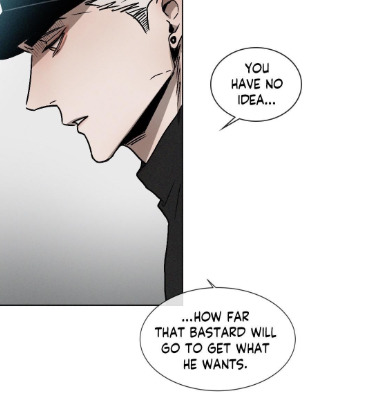
THE PHONE NUMBER
Compared to the veiled threats of what we see between Chiwoo and J (of what the author wants us to see), the relationship between K and Chiwoo is much more “usual school romance”, why K stressing over the idea that J could be a rival, and asking for Chiwoo’s number, and backing down when asked.
I want to particularly highlight this part, because the panels are one after the other, which shows that they must be read one in the context of the other.
We have here K, asking for Chiwoo’s number:

And just after, here we have J somehow having managed to get or find Chiwoo’s number and telling him:
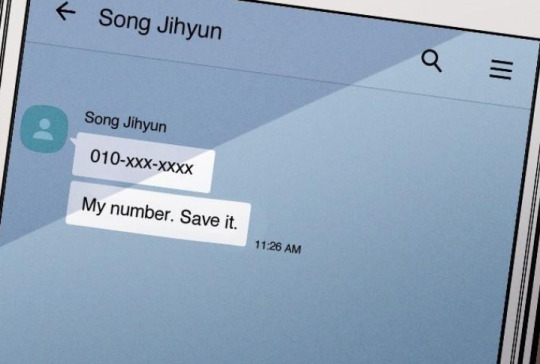
FRIENDS
I just wanted to also point out the different way J and K interact with Chiwoo when other people are around.
In the PAST we see that J does everything he can to keep Chiwoo isolated, from beating up a guy who could have become Chiwoo’s friend, to sleeping with Chiwoo’s date. And sorry after sorry, Chiwoo has no one else but J, so he forgives him.
Now in the PRESENT, we see that J starts to do the same thing. Literally putting himself between Chiwoo and his classmates (who, let me say, have started to warm up to Chiwoo thanks to K)
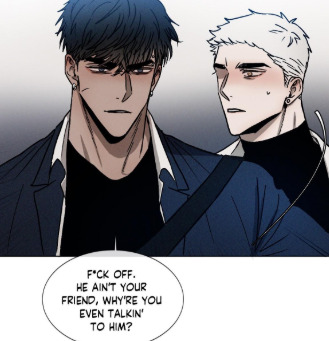
He also beat up a guy, and uses it as a way to coerce Chiwoo into paying attention to him.
Yes, what a classic move! When you are in love with someone and threaten their friends so that your lover knows they are being punished for ignoring you!

ASSAULT #2
The next day, Chiwoo finds J out of his house. I call this scene assault #2 because this is what it is. Chiwoo realizes, once more, that there are no words that can get through to J.
He has tried with the no, and now he reiterates with expressing WHY he wishes J could listen to him. He EXPLICITLY tells J that J’s presence makes him feel like shit. This interaction happens around chapter 13, and is just after Chiwoo has spent the day with K.
Here, J DEMANDS to know what he can do to be forgiven, as if Chiwoo is a toy that used to function in a certain way, but now doesn’t give the appropriate responses at the appropriate command.
This is also absolutely dreadful, so I am not going to post screencaps, but there is NOTHING romantic about the feeling of being trapped and the dread that is drawn into Chiwoo, the moment he realizes he is going to be alone in the house with J.
And the focus here is: J keeps pretending to not know why Chiwoo hates him, why Chiwoo cannot accept his apology, but the moment Chiwoo’s mother leaves, J perfectly knows that the threat of a second assault is terrifying and realistic. This horrible scene is even worse when compared with the images of K angsting about his teenage crush on Chiwoo.
ALSO, I counted them. Chiwoo says stop 5 times and let go 2 times.
While J has been pretending to not know what upset Chiwoo, he has been knowing all along that the assault has scarred Chiwoo and does scare him to death, because he makes the direct connection of “You have been ignoring me, now I can ignore your no, and see, this is what happens, I told you to be careful”.
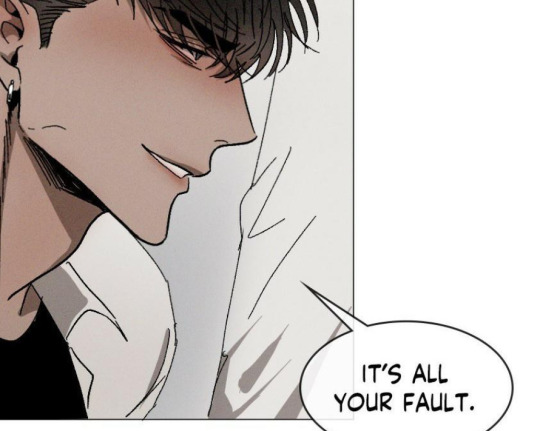
THIS IS MY MAIN POINT. Here, like in the past, there is no love in J’s actions, the assault is not a moment of passion, but a punishment. Now for having been ignored, then for having been ignored.
Luckily, this time, he stops, when he sees Chiwoo crying, but it is like he doesn’t SEE. He is wounded that Chiwoo would treat him like this, would speak to him like this, he WARNS him again to be careful with his words while literally looming over him.
J at this point realizes that he still has to earn his usual forgiveness, he thinks he knows how this goes along, he just needs to do be around Chiwoo, like usual, and Chiwoo one day will forgive him.
And this is it, this is the most terrifying part. Chiwoo had just went through another traumatic experienced, caused by J, and flashbacks of being raped by J, and what J tells him is
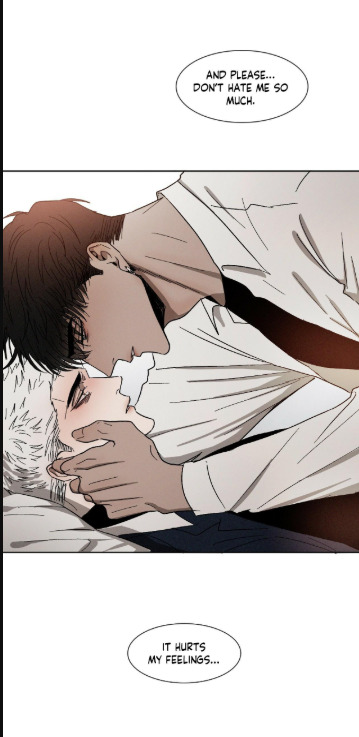
It hurts MY feelings. This is classic narcissistic abuser, manipulating people into looking at him as the victim, into pitying him.
Luckily, this time Chiwoo catches up on it, and out of his thoughts we have the confirmation that this is what J does, abuses and then asks for pity and forgiveness.
OTHER SMALL THINGS
- Just the way the whole panel turns dark and gloomy, when Chiwoo thinks about J.
- Also, none of these messages from J exudes worry. One of them specifically says “Who are you with?”

And look at the difference between the messages K sends him:

- The way the interaction between K and Chiwoo are drawn. There are no black gloomy panels, no flinching. Chiwoo actually smiles

- The way Chiwoo remarks multiple time his frustration at trying to talk with J and how J just doesn’t want to hear him
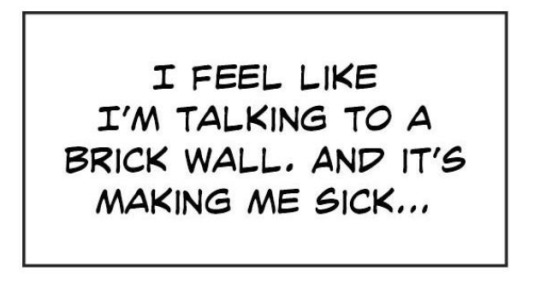
KEEP READING (part 2)
69 notes
·
View notes
Link
We all take things personally because we are all, well, people, aka, persons. We live our lives through our own eyes and experiences, right? This is how people argue with one another, whether that’s in real life or online. “In my experience,” or “In my humble opinion,” is how most of these debates begin.
What if you view things from another’s’ perspective? As the saying goes, “Walk a mile in someone else’s shoes.” In this age of controversy, that’s mighty difficult, particularly from a political or religious perspective. I’m constantly amazed at the responses some men give me about being a childhood sexual abuse and rape survivor – what they would have done in my situation, 🙄when they cannot comprehend what it was like for me (at age eleven) or in college.
It can be quite frustrating to explain my perspective and experiences to people who have absolutely no comprehension of what it’s like to live through these experiences, and to be treated as if I’m to blame for what happened.
One of the most effective ways I’ve learned to not take anything personally is by learning and using The Four Agreements, a small yet effective code of conduct by Don Miguel Ruiz. Don’t Take Anything Personally is the Second Agreement. I’ll break it down for you here with examples and how to apply it to your own life as a survivor.
Let’s deconstruct.
Taking Things Personally Causes Frustration
Take my example above: if a man says to me, “Why didn’t you fight back?” which is a typical, ignorant answer from a non-survivor who understands nothing about how the brain reacts to trauma, I become frustrated because I want to educate him with facts and science. Facts and science do not work on someone whose intent is to denigrate and victim-blame me.
The onus is on me to take a breath and examine the intent of the person who is interacting with me:
What’s in it for him?
Does he want to learn more about sexual abuse survivors and trauma?
How the brain reacts to trauma?
How he can help others who have been raped or abused?
Since the Third Agreement is Don’t Make Assumptions, I have the choice to continue interacting with the person and attempt to have a meaningful, educational discussion to move the narrative forward, or I can shut it down and move on, saving myself the possible frustration of what could potentially upset me further.
In an argument, each side wants to defend their position because we feel we must be right in order to win. Decide what ‘winning’ is going to cost you.
I have the choice, here. I have the agency to own how I take comments from this man (if at all – the Block and Mute buttons are our friends on social media). If I’m having this discussion with someone in real life, I can decide to end the discussion or walk away if it’s not serving me or causing me frustration.
I can draw a boundary because this person’s comments are not about me at all – they come from his lived experiences or viewpoint.
And this is the key to not experiencing frustration when healing from sexual assault – what others say they believe in reaction to our truth is on them, not us.
Taking Things Personally Lowers Self-Esteem
Based on one survivor story:
Let’s say your mother tells you she doesn’t believe another family member sexually abused you as a child, and it crushes you. You find yourself alone and desperate to make her believe you at all costs. You spend years in therapy, yet it doesn’t help. You’re at odds with her over every small thing because this big thing looms large over your entire relationship. Understandable.
You starve yourself. You sleep around. You drink and dabble in drugs. You can’t keep a job. You self-harm. All because your mother, the person who is supposed to be in your corner, of all people, doesn’t believe you. When you look in the mirror, you hate your reflection. You speak so negatively to yourself, even your closest friends would be appalled (all common for survivors, by the way).
Trace that back to the fact that you have taken her disbelief personally. You’ve pinned all your hopes toward healing from this trauma onto one person: her. When in fact, healing depends on someone else entirely: YOU.
If someone isn’t treating you with love and respect, you are allowed to walk away from them.
This is also a boundary, and yes, part of not taking anything personally. What this mother did is terrible, absolutely. What this survivor needs is to stop looking for support from someone who refuses to give it, and realize she’s worthy of self-love and support from a community of survivors and therapists who will help her embrace her in healing.
This isn’t woo-woo shit. This is reality. If the people in your life aren’t bolstering your self-esteem, it’s on you to take action to change those circumstances, not them. If they don’t believe you, you can still seek help and support. Healing isn’t dependent on other people believing you – it’s dependent on you getting the support you need and deserve. Toxic people won’t give you that, so don’t give them anything.
I’ve been in this situation in the past with men. I left them. Cutting ties is the best thing.
Taking Things Personally Creates Conflict
We get defensive when someone calls us out on something they don’t agree with. Our lived experience is different from someone else’s. Intuitively, this makes sense. We fight for what, in our eyes, is right. Remember this:
Nothing other people do is because of you. It is because of themselves. Even when a situation seems so personal, even if others insult you directly, it has nothing to do with you. What they say, what they do, and the opinions they give are according to the agreements they have in their own minds. Their point of view comes from all the programming they received growing up. ~ Don Miguel Ruiz
I see this so much on social media, don’t you? I get caught up in it myself, especially with regard to victim-blaming survivors for being assaulted and abused or raped. I cannot, and will not, ever accept that it’s ever a survivor’s fault for a perpetrator committing a crime. We never blame a woman for being car-jacked or robbed at the ATM, do we? So why do people blame her for being raped? It’s mind-boggling to me. So yea, it feels personal.
And yet…I know in my heart, it’s not. People who victim-blame are conditioned by their own families, peers, news, media, and social media to take a stance that makes sense to them and their point of view, and that has nothing to do with me. Arguing with them, providing facts, sharing my experiences, etc., does nothing to help change their minds.
Example: When an (in)famous YouTuber tweeted: “Anxiety is created by you” (and then subsequently deleted it because wow, so uninformed), many of his bro-dudes supported him by explaining that it’s true – all mental illnesses could simply go away if we just tried harder, worked out more, and stopped being victims.
I’ll admit, I got involved in attempting to educate some of these bro-dudes by sharing that mental illness isn’t something that goes away like a bad cold, or is a figment of our imaginations. Sure, it’s all in our heads – our brains, that is. And so on.
Oy, the mansplaining. What could I – a woman of 55 years, who has studied mental illness for over twenty years (longer than most of those kids have been alive LOL), who has anxiety, depression, and cPTSD, who has written two books about it (so far) that have been vetted and reviewed by several psychologists, who hosts a weekly Twitter #SexAbuseChat that deals with mental illness specifically for survivors of sexual abuse – know about mental illness?
Yet, you see, it didn’t matter. I took it personally. They took it personally. It was no longer about mental illness – it became more about who was right. My facts, stats, and science had nothing on their put-downs and misogynistic chuckles.
There could be no conflict resolution because our values would never align.
Once I reeled myself back in, I began writing this post. I reminded myself not to take it personally because what they were saying wasn’t about me. I reminded myself about my own healing boundaries, self-care, and how to put my energies into something more positive – writing.
Taking Things Personally Takes Energy
As I just mentioned, that interaction took enormous energy; energy I could use elsewhere. And that’s really the crux of this post. Where are we spending our energy when we take something personally? Usually, we end up in a negative loop of toxicity. That’s part of the cycle our brains play with us, a pattern we may not be aware of. Becoming aware of this pattern allows us to change it. That’s what these agreements help us do.
It hurts when people say something negative about us, and we take it personally. The wound festers; we poke at it, and peel at that scab. We’re so focused on the one comment, we shut out everything else, even the positive stuff, to the point that we’re missing out on life.
Example: In my BadRedhead Media business, I work with authors. Authors receive book reviews, oftentimes from non-professional reviewers. Sometimes, these reviews are verging on the ridiculous. That’s just the way it is. Amazon and other online retailers allow for these reviews. It is what it is. As an author myself, I, too, receive these reviews.
We tend to focus on these rare and silly one-star reviews, rather than the majority of five-star, terrific reviews. This is knowns as the negativity bias, which means our brains are hard-wired to focus on the negative, most likely due to evolution:
The evolutionary perspective suggests that this tendency to dwell on the negative more than the positive is simply one way the brain tries to keep us safe.
We’re not doomed, however. By not taking things personally, we are reframing these situations, and using our energy differently. Comments that strike us as negative could potentially be a learning experience, even if we feel offended. Always be on the lookout for a learning opportunity, or ways to utilize that energy toward something more useful.
Ask yourself these questions to refocus your energy:
What can I learn from this?
What difference will this make in my life?
How can I change what I’m doing with this reaction (or do I need to)?
What activity can do I do now to take myself out of this situation?
How can I change my thinking pattern to grow from this?
Listen, none of us is perfect. I first read The Four Agreements back in the 90s, and found it useful because it helped me make sense of a difficult situation in a corporate setting. I now find it helpful as both an author and entrepreneur, as well as a mom. Being on social media and online is a crucial part of my business, so I deal with many different types of people constantly. If I took everything they say personally, I’d never get out of bed.
If you aren’t getting what you need from someone or something, remember – it’s okay to withdraw. You aren’t a loser. Maintaining peace in your life and focusing on your healing will always “win.”
Please share your thoughts and comments below.
Do you need help right now? Please contact RAINN at rainn.org or 24/7 at 1.800.656.HOPE
***
Read more about Rachel’s experiences in the award-winning book, Broken Pieces.
She goes into more detail about living with PTSD and realizing the effects of how being a survivor affected her life in
Broken Places, available in print everywhere!
The post 4 Reasons Taking Things Personally Prevents Healing appeared first on Rachel Thompson.
via Rachel Thompson
1 note
·
View note
Note
It can be in general if you want. Just curious.
Okay, well…
Flash is one of my favorite shows, so I obviously have a lot of love for the show, the characters, and most of what they’ve done. That said. I have…problems, too.
As the main character, I do think Barry has been treated with the most care and consideration. Which makes sense. I do think they tend to go a bit overboard in making Barry responsible/making Barry feel responsible/making others hold Barry responsible for things that aren’t necessarily his to carry. It’s a pretty common thing superhero shows do, though. I can’t think of one of the top of my head that hasn’t overdone it a bit with the hero blame game. Some have even been worse. But outside of that, while I’ve not always loved what they’ve done to Barry…they generally do get him involved in every story, they think about how events impact him, and they try to flesh out both sides of his role - both the Barry Allen/personal life side and the Flash/heroic side.
Iris West is…in many ways…well written and one of the better fleshed out characters. I’ll admit that I think that’s in part because of the backstory they’ve given Barry and her, more than I think it would necessarily be true under other circumstances. That is to say, we obviously get the most background and attention to Barry’s story. Part of Barry’s story is his relationship with Iris from when they were kids and his resulting relationship with Joe. Therefore, we get to see more of Iris and Joe, we get to hear more about her life growing up, we get to know a bit more of her background. If she had been a stranger introduced to Barry in the Pilot and with no connection to him and his story until that point, would we have as much background on her and would she be as developed as she is? Well, I look at Caitlin and I think…probably not.
Which is a problem, in that all characters should be well developed, whether or not they come in with a connection to the hero or are strangers. But where I think the show has always fallen down the most is in its treatment of women.
Look at Caitlin. It took two seasons to find out her dad was dead and three to find out about her mom and get any background there. Even the actress said she didn’t know her background for a couple of years. The background we got in Season 1 for her character was her relationship to Ronnie, and that was so the audience would care about Ronnie when he was introduced and would be invested in his relationship with Caitlin, at least, from the jump.
The show has consistently invested in father/son relationships - Barry/Joe, Barry/Henry, Barry/Wells, Cisco/Wells, Cisco/Harry (to a lesser degree), even to an extent Wally/Joe. But the hashtag #doyouhaveadaughterJoe didn’t come from nowhere. They HAVE done better with that as the years have gone by (though 2A was still problematic, since everyone talked ABOUT Iris instead of TO her). But the fact they acknowledged they were aware of the hashtag makes me wonder if they would have improved in that area if they hadn’t been called on it.
And, to be frank, they’ve never had that kind of exploration of dynamic for Caitlin. They KIND OF implied a mild father/daughter dynamic in season 1. And her line about “if he is who you say he is, the past year of my life has been a lie.” But notice when the revelation of Reverse Flash’s identity was made, Cisco got his own moment of confrontation and catharsis. He got to confront the man who had lied to him and come to terms with all that meant. But Caitlin never did. After they established that the truth would make her ENTIRE LIFE for an ENTIRE YEAR a lie.
So that’s not great. Nor is it great that they took four years to think MAYBE the show could use some sort of relationship between the women on it. And now it only comes on the heels of one trying to kill the other. Four years to realize you have two women on the show and they should maybe talk on occasion? Badly done.
In terms of relationships, they tend to think about the women on the show in terms of their romantic ties. Other things come more secondary to them than they should. Caitlin’s story in season 1 was primarily about Ronnie - tying him emotionally to the narrative - and being a sounding board for Barry in his feelings about Iris. Season 2, they used her as another emotional tie to Jay, explaining his continued wet blanket presence and why we should care - and, eventually, why we should care he was the big bad. (He wasn’t nearly as close to Barry or Cisco as to Caitlin at that point, let’s be honest.) Just look at how the season ended. He kidnapped her because he loved her so much and threatened to kill everyone if she left him and then just…let her go. It was a hot, nonsensical mess, and it wasn’t a great focus for Caitlin’s story.
Season 3, she was tied - once again - to Julian. Once again to really provide the tie for him to be on the team, because does it really make sense that Barry would care that much either way? They were hardly friends. And to do it, they had Julian conveniently ignore that she’d tried to kill him the first time she met him. Yes, it was Killer Frost, but the show last season didn’t bother to explore how much the two were the same and how much the were different. And even if it had, it wasn’t for Julian. If you had someone try to kill you and then their identical twin came up and played nice, would you be so quick to mentally distinguish the two? Or would you just peace the hell out on that?
Then she became Killer Frost, which SHOULD have been a great story arc for her. It had all the potential to be. But even Panabaker said lately at a con that she’d asked NUMEROUS times why Frost would want to kill Iris and she’d never been given an answer. Which tells me they never bothered to think of one. And THAT is a problem. The constant writing for Caitlin without bothering to think it through, without bothering to think of motivations, without bothering to address the impact on her…it’s a big problem for me.
Her connection with Julian ended up being implied - if not explained - that they wanted these two men (Julian and Cisco) to fight for Caitlin. Or her soul. Or something. Which again made her the object. And, again, wouldn’t have been that big of a deal if they put her and her motivations more in the driver’s seat of her story.
Bringing this back to Iris. They’ve again done somewhat better in some ways as regards her character, but let’s be honest…their consideration for women has been one of their weakest areas across the board. Are the recent allegations THAT surprising, given how much they apparently think about women from what you can discern on screen?
Iris had a…decent reporting arc in the first season. It could have been better. All things considered, though, it could have also been worse. It could have been totally ignored. As it has been lately.
In this respect, Caitlin has been treated better. Though, like my point above about the treatment of backstory and family, this is likely her version of getting the better end of the stick because the very structure of the narrative allows her to be. She works at STAR Labs. Most of the exposition and problem solving happens at STAR Labs. Therefore, we see her at her work place more often as a matter of course. If she had a different job, would we see her doing it very often? I’d venture to say…about as much as we’ve seen Iris at hers.
Because the focus on Caitlin at work is more a matter of convenience for the writers, not an extension of wanting to give this character more focus and attention and fleshing out. They aren’t showing Caitlin at work because they want to establish Caitlin at her job and how her work impacts her. They’re showing Caitlin at work because SOMEONE has to explain to the audience what the science circles mean, we spent a lot of money on this set, damn it, and she works here so she can take part in explaining it. Notice in season 2, when Caitlin was kidnapped by Zoom, they had Jesse step in and take her place and everyone just seemed…okay with that. (Well, maybe Cisco didn’t.)
It isn’t about the character. And it doesn’t have to be all the time, but it should be more than it is.
Iris’s role as reporter has been reduced to the point where even Patton doesn’t know when it’ll come into play again. And, again, this isn’t an extension of the writers pondering her growth and deciding to move her into another profession. In their minds, she’s probably still a reporter. Given the future headline, at least, she will be in the future if she isn’t now. They certainly haven’t addressed it on screen or had Iris make a decision about her career. As much as I LOVE her taking charge at the lab and I think it makes a lot of sense why she would - and I love seeing her with the agency she’s been given - I’m also frustrated that it is in its own way a measure of convenience. They should at least address the journalism thing. They should even still use it in the narrative on occasion. it’s just…more convenient not to.
And it’s a problem for me that - much as I love Westallen - they’ve ignored the biggest aspect of her life that was separate from her relationship with Barry. And, as I said…I won’t say that Iris (or even Caitlin) is “just a love interest” but I will say that the writers perceive their stories from the love interest angle more than they should. What I mean by that is…again, look at season 3. For both women. Iris found out she was going to die, and after a few minutes of being allowed to grieve, the narrative shifted back to Barry as actor and, to more of an extent than it should have done, Iris as object. Iris supported him and encouraged him and gave faith in him, but the focus on the story about HER death wasn’t about HER dealing with it. It was on Barry and how he would be destroyed if she died.
For Caitlin, she became Killer Frost but the focus wasn’t on who Killer Frost was or why she automatically went evil when nobody else did or whether Frosty and she were the same person or if they were two entirely different personalities or why Frosty would make the choices she did. She made the choices she did for “reasons.” That was literally the explanation in the narrative. “I have my reasons.” But she apparently didn’t because even Panabaker was never given them.
No, the focus even there was on Cisco and Julian and how they wanted to fight to bring Caitlin back and help her and get through to her. Their faith that she could be saved. Cisco’s backstory with her and his grief for and loss of his friend. (I do love her friendship with Cisco and think that’s been one of the best developed areas for her character.)
So. Aaaaaaaaaaaaaall of that is pretty problematic. That said, I don’t want to make it seem like everything they’ve done with Iris - or with Caitlin - has been trash. Iris is still one of my favorite characters for a reason. I love that all the women on the show have been smart. (At least on paper; I’m still giving some serious side eye to them writing Patty like she was a tween. But she had degrees, so I’ll allow she was supposed to be smart.) Iris is the heart of the show, for me, and that’s not just because of her romance with Barry. I love how she’s caring and compassionate and how she’s take-charge and fearless.
But I also have my criticisms - criticisms that fall on the writing for the women far more than they do the men, I think.
Which isn’t to say that their writing for the men outside of Barry has been absolutely above reproach. But compare the writing for Caitlin, for example, for Cisco. Just look at the way they handled her meta arc compared to his. While I had HUGE problems with the arc they gave him, they did explain why he was afraid his powers would turn him evil. They were given to him by the Reverse Flash. He struggled with how to deal with them and develop them, even if they’ve been a little loose at times with defining what he could and couldn’t do. And even though Cisco on Earth 2 was also evil, when Cisco said he was afraid he would also be evil, everyone’s response was “that’s not necessarily true! We won’t let that happen! You’re a good guy!” Whereas with Caitlin, that wasn’t even a discussion. It was just “Well…yeah. Obviously, you’ll go bad if you become Killer Frost. We should nip that in the bud right now.” And not because the show gave any particular reason WHY she would automatically go bad. But because…they just didn’t care to address it either way, to give a reason why she would automatically go bad or think she would automatically go bad or why everyone else would think she would automatically go bad.
See what I mean about the difference?
Cisco was underutilized in the first season, until his death scene. At that point, the show runners seemed to realize how much more he could do and they started giving him more. At which point, they did focus more on developing his friendship with Barry (in a way they have never bothered to do with Caitlin. Sorry, but Caitlin and Barry aren’t best friends. Caitlin has always been closest to Cisco. Barry has always been closest to Iris and then Cisco. Do I think they want to keep the two apart for shipping reasons, as other shippers have alleged? Hardly. I just think the level they think about and focus on the characters tends to put the men and their relationships first and the women and their relationships second.)
Interestingly for Cisco, while the women seemed to be thought of through the lens of their romantic prospects and relationships, Cisco was almost overlooked in terms of love. That was the area they thought about him the least. Don’t even get me started on how crappy I found the “arc” of his relationship with Golden Glider. His relationship with Kendra was used in a very Caitlin-esque way - it was the means by which she was introduced to the story. It was the means by which they tried to get the audience to invest in her character before they moved her off to LoT.
They’ve done somewhat better with his relationship with Cynthia, in that they seem to be considering it more in terms of an actual romance for him and how it impacts both his character and hers. But it is odd how much it seems to have been swapped.
So their treatment of Cisco has bit a bit hit-and-miss, but a bit more hit than miss. They’ve given his character more consideration in terms of how things would impact his character. They let Wells’s betrayal impact him and showed how that lingered and stayed with him. They showed an arc of him coming to terms with his powers and learning to use them. They showed an arc of him coming to terms with being a hero. Flashpoint was a bit iffy. I think both Barry’s and Cisco’s actions and motivations made PERFECT SENSE for their respective characters. It would be convenient if grief were always rational, but it basically never is and that’s part of what makes it suck. But their wrap-up was a bit “meh” and then they dropped it like it never happened. From about mid-season last year to the present, Cisco might have never had a brother.
As for Wells…he’s been…a hot mess. Look. I loved him the first season. He was complex and interesting. The second season, he was…all right. I mean, I hated a lot of the stuff with Jesse. But he was…okay. The third season, they were clearly just trying to find something to do with him. And this season, they seem to be grasping at straws. I get that they like the actor, but they either need to sit down and think of an actual role for him or they need to do something else with him (move him to another show or let him go). Because the Council of Wells was ridiculous.
So I guess that’s what I think of the treatment of characters so far. There are some things I think they’ve done really, really well. But there are areas where…yeah, I think there have been problems.
I’m curious to know what happens now with AJK removed from the show. How much of the flaws were because there was someone in charge who - by all accounts - thought of women in a certain way that very clearly showed? (If it comes out that he was behind the measurements stuff in the last episode, I would not be surprised. In fact, I almost hope that’s the case. If it isn’t, whoever DID come up with that needs to be booted from the show. Immediately.) Not even necessarily in a way that was overtly sexist, but always putting their focus primarily on the men and to a much lesser extent to the women as characters.
Make sense?
10 notes
·
View notes
Text
Lamenting Dido*
Today I am announcing that we are forming the National Institute for Health Protection. This will have a single & relentless mission: protecting people from external threats to this country’s health, bringing the UK’s world-class science and scale into one coherent organisation. pic.twitter.com/v27UhhCT8Y
— Matt Hancock (@MattHancock) August 18, 2020
Since 2006 there have been, on and off, 7 anti-corruption champions, many of them well-known former Ministers in the twilight of their careers (Straw, Clarke, Pickles). It’s not clear what they have actually done or are meant to do, beyond fine words.
Some clarity has since been provided here. The focus is on supporting the government’s international strategy – teaching others how to be as incorruptible as Britain – and reviewing what departments and agencies are doing here. It is infused with the usual British complacency that this is something that largely happens elsewhere not here. But corruption is not simply rulers and their lackeys looting a country’s resources, stashing the proceeds in property and accounts in places like London or in one of Britain’s many offshore tax havens through shell companies and trusts (as Ukraine’s and Nigeria’s former rulers have done). Nor is it just the payment of bribes or granting of favours to unscrupulous public officials in less developed countries overseas. As Transparency International has pointed out, corruption can also be “politicians misusing public money or granting public jobs or contracts to their sponsors, friends and families”. Nothing as grubby as money changing hands need happen for corruption to exist.
There are ways to stop or minimise this happening: declaration of actual or potential conflicts of interests, Ministers recusing themselves from decisions involving friends and family, robust procurement policies so that contracts are awarded on the basis of publicly known criteria and standards, open advertisements for roles, transparent hiring processes, independent decisions, transparency about the terms, scrutiny by Parliament or other independent bodies and the ability to impose penalties for misbehaviour or to claw back monies which have been misspent or misused. These are necessary, no matter now small the sums at stake may be, no matter how urgent the need, because they are essential to maintaining trust between rulers and ruled (especially during emergencies). People have to trust – not just that their money is not misused – but that the process of awarding roles and contracts (and all the advantages that go with them) is fair and genuinely open, that it is not kept to a closed limited circle, that it does not become simply a mutual back-scratching exercise among those already closely connected.
Above all, there needs to be trust that the most suitable and competent people will be appointed – and for the right reasons. Corruption inevitably leads to incompetence and at all levels. If those at the top are there for the wrong reasons, how can anyone be confident that they will make tough decisions or speak truth to power or have good judgement or have the backs of their underlings? Or, above all, that they will be good at their job?
Matt Hancock should know all this of course, having been one of those anti-corruption champions back in 2014. So why is it that he has appointed Dido Harding (made a Tory Baroness in 2014 by David Cameron, with whom she studied at Oxford) as the new Head of the newly created National Institute for Health Protection without any of these steps having been taken? There has been no advertisement for candidates, no setting out of the job specification or the technical qualities, skills and experience wanted and needed, no interview process or assessment by reference to published criteria. No-one else has had the opportunity to put themselves forward. Everything has been done behind closed doors, quickly, without transparency or accountability or scrutiny. Nor does anyone seem to have wondered whether their financial interests in racing (Harding is on the Board of the Jockey Club, Hancock, Newmarket’s MP, is financed by numerous trainers) might possibly have made it unwise for Hancock to have made the decision to appoint her.
This new agency has been created in order to protect the country against a pandemic, this aim announced with a straight face by the Minister who a year ago agreed to the abolition of the committee set up specifically to prepare the country for a pandemic. Beyond that its precise scope, specifically, whether it will take over all of Public Health England’s previous functions (which went beyond pandemic preparation) is unclear. The government has suggested that it is modelled on Germany’s Robert Koch Institute, as if to show that it is sensibly seeking to copy a country which has had a much more effective testing system and, consequently, fewer Covid-19 deaths. It is a superficially plausible – but disingenuous – claim. Germany’s institute is headed by specialists in microbiology and infectious disease epidemiology with considerable experience in their fields and in public health generally. Harding has no such experience or expertise, her only prior NHS experience being the Chair of NHS Improvement since 2017. In that, she was notable for rejecting the advice of the Health Select Committee to sit as a crossbench rather than a Tory peer in order to avoid any conflict between her NHS role and her political leanings. Not much chance, then, of her speaking hard truths to Ministers.
What is there in her career justifying her being given such a critical role? Her experience ranges from McKinsey (the consultants invariably brought in by those CEOs and others too unimaginative to think for themselves, too scared to make their own decisions or just looking for someone else to blame) to various posts at a travel agent and supermarkets finally ending up at Talk Talk. 5 years after she became CEO, it suffered a sustained cyber-attack, for which it was woefully unprepared, resulting in the personal and banking details of 4 million customers being put at risk. Her responses to this were painfully embarrassing; the attack cost Talk Talk £60 million and the loss of 95,000 customers. This failure matters in a role which will necessarily involve the handling of sensitive medical and personal data. It’s not as if her time in charge of the NHS’s Test and Trace system since April has exactly been a success either or suggests that she’s learnt any lessons at all from her previous failure. Still, McKinsey has just charged £560,000 to come up with a “vision, purpose and narrative” for the new body so she’ll have some help. Phew!
So is this really the best person in the whole of the country to run this vital new body? How can anyone know or judge? Transparency and accountability mean little in reality when appointments are made on the basis of knowing who might be interested or happens to be in the building at the time rather than on objective criteria independently assessed against an organisation’s purpose.
What might the anti-corruption champion have to say about any of this? Nothing. John Penrose MP is Dido Harding’s husband. He’s conflicted on any number of levels. Some have noted his membership of the Advisory Board of the think tank “1828” which, long before Covid, recommended abolition of PHE and the NHS’s replacement by an insurance system, and wondered whether this is the agenda behind Harding’s appointment. This might be so or it might be 2 + 2 = 5. In the absence of a transparent recruitment process, it’s hardly surprising that such concerns are raised.
Not least because, in addition to trousering half a million quid, McKinsey get to use everyone’s personal, family, medical, financial and biometric data for 7 years after their work on this project has ended. This is not just extremely sensitive data. It is also very valuable. Why? For what? And we get a say in this how, exactly? Why would anyone sensible hand over sensitive data to an agency led by someone provenly unable to safeguard it and advised by a company which will use it for its own purposes? This cosy agreement privatising our data risks making the new agency ineffective in its ostensible purpose. No wonder some think there may be another agenda at play.
Dido Harding is another member of the “Failing Upwards” club (joining such luminaries as Williamson and Grayling). Concern at her appointment and the manner of it will probably not trouble the government much, if at all. It appears to think that the more it enrages its enemies, the better a decision is. It’s a childishly superficial approach to government.
More importantly, it is not calculated to result in good governance. It is government by an elite, a chumocracy, a group of like-minded friends and acquaintances, recycling the same small group of people, on the basis of who is known, who is part of the group, who one is comfortable with, a network of people with similar educations, social backgrounds and connections. This is how one chooses companions for a villa holiday not competent experienced people responsible for the health, lives and information of millions.
And those of us outside this charmed circle? Well, we’re the creatures wanting a change for the better now looking “from pig to man, and from man to pig” and finding it increasingly impossible to see the difference.
*Or why Hancock doesn’t know his Aeneas from his elbow.
Cyclefree
from politicalbetting.com https://www2.politicalbetting.com/index.php/archives/2020/08/19/lamenting-dido/ https://dangky.ric.win/
0 notes
Note
My boyfriend broke up with me out of nowhere, and I am shocked. He sid it’s nothing to do with our relationship, and he needs to figure out who he is personally. He said needs to know that he can take care of himself. He said he “most likely” will want to get back together with me after the spring semester, and he “guarantees” that he will remain exclusive to me. I feel devastated and really confused. I thought that we were both very happy. I feel nervous that he won’t want to get back together.
Response from Sulpicia:
That’s really awful; I was in a similar situation last year, and it completely sucks. It’s terrible to feel confused, powerless, lonely, and heartbroken, but I guess the only condolence is that you’re (hopefully) in a place where you’re around loved ones at the end of the year and there’s enough going on that you can be at least a little bit distracted.
College is a time when a lot of people are trying to figure out “who they are,” and so I don’t think it’s entirely surprising that he would be having some sort of identity struggle outside of you, especially if you’ve been going out for a while. Depending on how old you both are and your particular family situations, there may also be some sense that if you graduate and you’re still going out, that’s “it”; I know a lot of people in my (non-Princeton) peer group who are engaged/living together, and reckoning with those questions can be really scary and stressful. While I don’t ever *totally* buy the “it’s not you, it’s me” line, I think it’s probably fair to say that your boyfriend’s actions are more due to him trying to resolve his own personal stuff than anything you’ve done. This is cold comfort (I very, very much know this), but it’s good to remember that you’re not “to blame” for the end of the relationship.
That being said, it’s absolute garbage that he’s decided to dump you, take a sabbatical from the relationship to work on himself, then “probably” get back together, without you having a say in the situation. Equally garbage is his promise to remain “exclusive,” which I would guess is an expectation that you will also not be seeing anyone until he makes up his mind. I call BS. You are a fully-realized person with your own goals, needs, and life, not a side figure on this guy’s journey to self-actualization. I’m not going to assume your gender identity, but I think this is something that female-identifying people have to deal with a lot because of a lot of pervasive stereotypes that we see play out in our lives and the narratives we consume. You’re not a “love interest” he can pick up and set down at will; you’re your own person.
The healthiest thing for you to do is to respect that the relationship has ended, because if you exist in a state of denial/non-acceptance, you’re just going to make yourself more upset and spend all your time/energy trying to make this other person feel as bad as you do. However, as an equal party in your relationship, you also have an equal share in its dissolution. Talk to this guy and set terms that work for you. I think breaks are kind of pointless (especially because “break” tends to mean “I want to hook up with somebody else without facing repercussions” more than “I need time to think”), but if you think that could work, then set a specific time frame for the break and exactly what the “rules” are going to be in terms of contact, if you can see other people, etc. If you want a clean break, say that, and set down the rules for contact that work for you. You can always reevaluate, but it’s completely okay to say that you can’t be friends with them for now and you can’t have any form of contact for whatever period of time. I think it’s also fair to ask for more of an explanation, though he may not be able to give you one at the moment.
Once you have these rules, you really need to follow them. Learn from me; neither aggression or passive aggression will get you what you want. It’s better to keep your distance and maintain the moral high ground. Fortunately, you’re on break, and unless this boyfriend is from home and is someone you see all the time, this is the perfect time to detox and focus on the relationships that do matter. It’s also good to lean on your friends as sources of support and explain that you need them more than you did before. Breakups are often good times to reconnect with friends as who you spend time with shifts a lot (plus, many people will willingly listen because they love being at the periphery of juicy drama). And while he framed this as being about *his* personal growth, it can also be about yours, and I encourage you to use this time to live your best life and enjoy all the things you liked and he didn’t, or explore new things you didn’t have time to because you were in a relationship.
Another thing to remember is that things are bad now. You’re grieving this relationship that you lost, and you can’t even really romanticize it because this person who made you so happy once also did this shitty, selfish thing to you (it’s not selfish to want to figure yourself out; it is selfish to abruptly cut off a relationship with no real explanation #hottake). It takes a long time to get over a relationship, and it’s not a linear process; you might be fine one day and awful the next, because that’s just how this goes. The goal is mainly to distract yourself from this thing that causes you grief until you eventually begin to have new things in your life unconnected to this person, and you reform your life so that you’re not always thinking about them, or how they would perceive your actions, or what you can say or do to make them maximally upset. When you think this way, you give them the power and agency in your life, even when they’re not there, and that’s not fair to you. So even when it’s hard, resist this urge and try to focus on living life on your own terms.
And yes, maybe things will shake out one way and you’ll get back together. But it’s not worth making yourself miserable or trying to poke your way into the edges of his life and attempt to render yourself so desirable that he can’t say no to you, because then you’re making him and relationship that doesn’t exist anymore at the center of your life, rather than your own pursuits. Getting back together will happen if it happens, but you can’t live life hanging on a “maybe.” Many people told me to focus on me, but I couldn’t get it though my thick skull. I hope that this was a little bit helpful and that I’ve saved you at least some of the pain and rage and frustration that I felt when I was in your shoes. I don’t want to air out my dirty laundry, but I have a lot of regrets about that time in my life because I was putting this old relationship first, rather than myself.
Even if you don’t listen to any of my advice please, for me, make yourself a cup of hot chocolate and go watch a movie you like.
0 notes
Text
Trump’s quest for vengeance against John Brennan
New Post has been published on https://thebiafrastar.com/trumps-quest-for-vengeance-against-john-brennan/
Trump’s quest for vengeance against John Brennan
The FBI launched its counterintelligence probe after learning that a Trump campaign aide, George Papadopoulos, was offered “dirt” on Clinton from a Russian proxy — Mifsud — and had told an Australian diplomat about it. Australian officials tipped off their American counterparts to Papadopoulos’s admission, though it’s still unclear who was initially tipped off, and that’s reportedly a subject of Barr’s investigation. The bureau then flew former FBI agent Peter Strzok over to London to interview Downer and an associate about his interactions with Papadopoulos.
Papadopoulos pleaded guilty in 2017 to lying to the FBI about his relationship with Mifsud, but he has since claimed, without evidence, that the professor was actually an intelligence plant sent by the CIA to entrap him and give the FBI an excuse to open an investigation.
The two agencies have a fraught history that at times has descended into open bureaucratic warfare. After the 9/11 attacks, for instance, officials at the CIA and the FBI blamed one another for lapses that failed to stop al Qaeda. And they sharply differed in their approaches to interrogating terrorist suspects, with FBI officials blasting their counterparts in Langley as brutish amateurs in the art of extracting valuable information.
The Durham probe also threatens to break those fissures back open.
The CIA and FBI “certainly strive to work together, and if information comes from the agency and they think it’s reliable, we do put a lot of weight on that,” said one of the former FBI officials. “But we also ask a lot of questions and don’t swallow anything hook line and sinker. No one is the toady of any other agency.”
Brennan allies and skeptics of the Durham investigation note that the CIA played no role in the probe involving Americans, and was narrowly focused on determining Russian President Vladimir Putin’s motivations and how the Kremlin was carrying out its election attack in 2016.
“The CIA was focused on Russia’s interference in the election and the role that Russian officials played,” said Nick Shapiro, who served as Brennan’s chief of staff at the CIA and is now his spokesman. “In our government, the FBI is who conducts counterintelligence investigations on U.S. citizens. What Barr and Trump are reportedly up to not only doesn’t make any sense whatsoever, but it is yet another dangerous abuse of power, something that seems to now happen on a daily basis in this administration.”
“Any investigation into John Brennan by this corrupt administration must — on its face — be viewed with a minimum with maximum skepticism,” said former CIA spokesman George Little. “The intelligence community deserves the respect of the president and his Cabinet, not politically motivated investigations.”
A source close to the White House said the president has been “warned repeatedly by smart legal minds around him to stay out of” the investigation. But he also claimed that “a big chunk of the Barr-Durham investigation” is believed to involve “top Obama administration officials, including Brennan.”
Another person close to the president said that Brennan is a “topic of conversation” in the White House. He said he didn’t know for sure whether Trump told Barr to focus on Brennan, but “I wouldn’t be surprised.”
Durham hung up when called by POLITICO and didn’t respond to a follow-up text message. DOJ declined to comment.
Asked for comment, White House deputy press Secretary Hogan Gidley said: “John Brennan lied before Congress when he got caught spying on American citizens and lied about having Russian collusion evidence that never existed. The only way I’ve ever heard anyone in the White House mention him is as a punchline.”
Brennan has in the past called Durham a “very well-respected individual.” But he largely wrote off the ongoing Durham-Barr probe in an interview earlier this month. “I’m supposedly going to be interviewed by Mr. Durham as part of this non-investigation,” Brennan said on MSNBC. “I don’t understand the predication of this worldwide effort to try to uncover dirt” on the 2016 Russia probe.
One former White House official acknowledged that Brennan’s rhetoric has made him a target. Trump “is hyper-sensitive about any type of criticism of any kind, he’s always got to be the smartest guy, he’s always got to know more than everybody else,” he said.
Brennan has not been understated in his criticism: In July 2018, after Trump sided with Russian President Vladimir Putin over the U.S. intelligence community in a press conference in Helsinki, Finland, Brennan tweeted that Trump was “wholly in the pocket of Putin.” He has also called Trump “treasonous,” though —after Mueller could not establish that Trump had engaged in a criminal conspiracy with Russia — he softened his tone, saying he may have received “bad information” about the extent of the Trump campaign’s Russia ties.
What little Barr has said about the Durham probe is directly at odds with Brennan’s language. “How did the bogus narrative begin that Trump was essentially in cahoots with Russia to interfere with the U.S. election?” he said in July, describing one of the questions he hoped to answer.
As with the IG report, Trump’s allies have been raising expectations for the Durham investigation for months, predicting that he will uncover a deep state plot to stage a “coup” against the president. Durham and Barr have been focusing primarily on the intelligence community—reportedly seeking interviews with the CIA analysts who drew conclusions about Putin’s motivations in 2016—and have not requested interviews with any of the senior FBI or DOJ employees who were directly involved in the opening of the Russia investigation in 2016, according to people familiar with the matter.
Barr has also been fixated on the question of how the intelligence community determined that Russia intervened specifically to help Trump win rather than to just sow chaos and distrust in the Democratic process, according to the New York Times. But as POLITICO first reported, that question has already been asked and answered at the CIA’s highest levels — by Mike Pompeo, a Trump loyalist.
Just after Pompeo took over as CIA director in 2017, he conducted a personal review of the CIA’s findings, grilling analysts on their conclusions in a challenging and at times combative interview, people familiar with the matter said. He ultimately found no evidence of any wrongdoing, or that the analysts had been under political pressure to produce their findings.
The intelligence community also released a joint assessment in January 2017 concluding that Putin directed a wide-ranging interference campaign aimed at harming Hillary Clinton’s candidacy, and Special Counsel Robert Mueller’s report detailed dozens of contacts between the Trump campaign and Russians in 2016.
Trump has refused to accept the intelligence community’s conclusions, however, instead pointing the finger at Ukraine, the Obama administration, and the private cybersecurity firm that confirmed the Russians had hacked the Democratic National Committee.
Ironically, Barr’s long Washington career began at the CIA, he noted in the same oral history interview, at a time when the intelligence community was under assault from congressional Democrats who believed the agency had run amok in part by spying on the domestic political activities of American citizens.
As a young lawyer in the CIA’s office of legislative counsel, Barr helped the agency contain what it saw as damaging overreach by Capitol Hill. In testimony before his 1991 confirmation as attorney general, he described his role as “analyzing the impact of proposed legislation on Agency operations, drafting Agency bill comments, drafting Hill testimony, carrying on liaison with congressional committee staffs.”
He’s also no stranger to interagency battles: It was Barr who recommended that Bush oust FBI director William Sessions, who was accused of serious misconduct in an internal DOJ watchdog report. Barr was ultimately vindicated when Bill Clinton, a successor he disdained for what he called his defects of character, removed Sessions in 1993.
One veteran Washington Republican who has worked with Barr in past administrations and previously respected him said that he has been surprised and disappointed in Barr, describing him as a “henchman” for Trump.
And intelligence veterans affiliated with both parties have leapt to the defense of their former colleagues, noting that it wasn’t just the CIA that was concerned about Moscow’s support for the Trump campaign.
“Talk about witch hunts!” said former CIA director Michael Hayden, who served during the George W. Bush administration. “This is a perfect example of that. Russian interference in the 2016 election was the judgment of the entire intelligence community. And it remains so today.”
Read More
0 notes
Text
The Class of 2017
This one is starting early, inspired by my least favorite movie of the year. I’ve got a bunch more on my list I’ll get to at some point.
Strong Island - Yance Ford

I don’t watch documentaries, but of the three I saw from last year this portrait of a family’s grief was my favorite. Because it was visceral and simple, catching a family as it processes the death of its oldest son, and then learns the circumstances surrounding why his murderer was never charged.
Columbus - Kogonada

It’s not just the architecture, which is fantastic throughout--every shot is set up to look as striking and pretty as it can, like a movie that was filmed entirely inside the Met.
Last Men in Aleppo - Feras Fayyad and Steen Johannessen
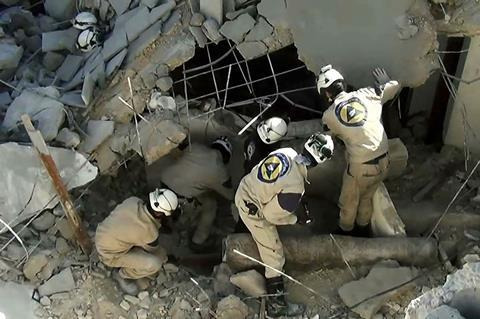
I’m not gonna say anything bad about this movie. I’m not a lunatic. It’s not an easy thing to see real footage of dead babies, but one of several interesting things in this documentary is how these guys go from digging bodies out of rubble to attending a wedding. Life goes on, it turns out, even in a place like Syria. These are people who fantasize about going to Turkey, but recognize that they’d be greeted with resentment and bigotry there, and anyway feel a responsibility to stay in their homeland. Their happiness comes from being with their friends, and occasionally planting trees, or buying some pet fish. Their day job is rescuing people from random air strikes perpetrated by their own government. They’re legitimate heroes, and Bashar al-Assad is a legitimate monster. One funny thing, the user score for this movie on Metacritic is a bizarrely low 3.3, with a handful of reviews that accuse it of being Al-Qaeda propaganda. The reviews are written by people with user names like MetacriticSuccs, so credit to the Russian cyber agency for their thoroughness.
Detroit - Kathryn Bigelow

Kathryn Bigelow has become the master of telling macro stories about chaos. The first half hour about how riots turned Detroit into a war zone are perfect--maybe her best contained piece of filmmaking yet. When this movie settles into its plot--about how a bunch of racist cops tortured a group of black people in a cheap hotel--it’s such a natural extension of what she’s good at that it doesn’t feel like it all takes place in a single location, even though it does. As the night wears on you start to realize that in black cities like Detroit police were and maybe still are barely disguised domestic terrorists. When a character asks someone “will we be safe?” she’s referring to the cops, but she might as well be referring to the villain in a horror movie. This one shoulda got a lot more attention.
Personal Shopper - Olivier Assayas

I’ll start with a criticism: Kristen Stewart is really bad here. I actually think she’s a great actress, but here she’s a collection of her worst impulses: tics and stuttering, like an SNL parody of her. It’s actually not much of a liability though, because this is a movie that’s entirely about events and mood. I’m like six viewings away from understanding what the hell is going on in it, so here are just some thoughts: the movie does away with any ambiguity about whether ghosts are real. They’re all over the place, haunting houses and generally causing mischief. But the clarity on an afterlife does nothing to explain the plot of this movie. The bulk of it takes the form of an extended conversation over text between the main character and a mystery presence. It’s never explained whether this presence is haunting her or helping her, if it’s a ghost or a person or a figment of her own imagination. I half-heartedly entertained a theory that it was the boyfriend of the woman she worked for her screwing with her, which would make enough sense to be plausible, but not enough to provide the movie with any sense of resolution. Basically I have no idea what Assayas is trying to say, or what any of this means. I don’t know if I’m supposed to. It doesn’t matter. This movie is creepy as hell, and incredibly, superlatively good.
Lady MacBeth - William Oldroyd
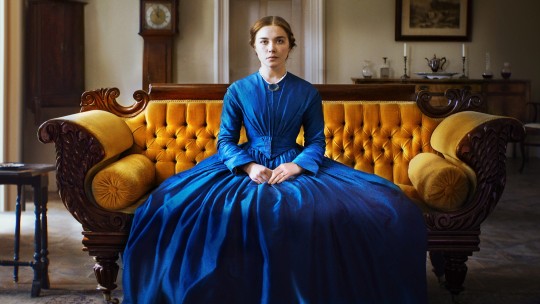
This movie is called Lady MacBeth because it’s essentially a retelling of MacBeth, if his wife had been more willing to get her hands dirty. It looks and feels like a period drama about a marriage arranged between families for financial reasons and a resulting affair of passion, but it never actually is that. From minute one it’s pitched at such a tense, bizarre level, that when Mrs. MacBeth switches from a sympathetic if inscrutable kept woman to a full out psycho, it’s not all that unexpected or surprising. It’s still heavy though, because MacBeth is a heavy play. And this movie absolutely lives up to that ambition.
The Florida Project - Sean Baker

Sean Baker’s last movie was about two black transgendered prostitutes in LA--a demographic that to my knowledge has never been the focus of a movie before--and rather than ask his audience to pity them he just told a story about them. It worked so well for me because it never felt like he was trying to please the cultural moment. He just realized this was an underreported American vibrancy. Here he takes a slightly different approach. Everyone and their mother has taken a stab at American poverty, but Baker manages to tell a story about adults living in harrowing conditions from the point of view of children who don’t realize their situation is difficult and so don’t feel any difficulty. Actually, now that I think about it, they are pretty similar. Both movies are about how daily life can keep the sadness about one’s condition at bay. For the prostitutes in Southern California, it’s whatever workaday stuff they have to deal with at any given moment. For the left behind margin-dwellers in this movie, it’s either children or childhood.
The Beguiled - Sofia Coppola
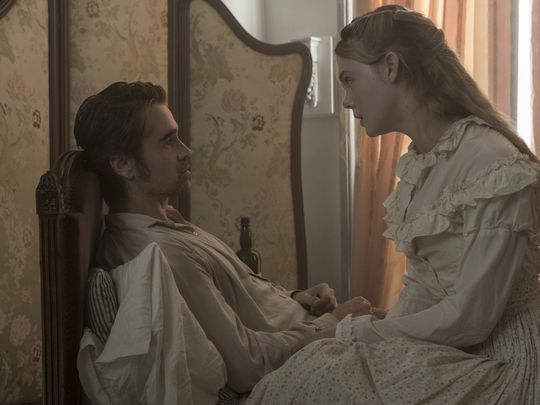
90 minutes on female horniness and the color white. Who says no?
Beatriz at Dinner - Miguel Arteta

You’ll forgive me for thinking this was going to be the cringe comedy it was billed as, with a Trumpian bent as a casually racist rich old guy makes increasingly inappropriate comments to an unexpected Mexican houseguest. But in retrospect, doing that would have put the onus on the Mexican to be uncomfortable, and that’s not what this movie wants to do at all. Instead she spends the whole night making everyone else deeply, cringingly uncomfortable. Which makes this movie much more interesting than the one it was billed as.
Gerald’s Game - Mike Flanagan

I’m going to reiterate an earlier point, which is that for a basic bang for your buck, it’s hard to do better than well made low budget horror flicks. Get Out may win the best picture Oscar, but at it’s heart it’s really just a best case scenario for what these movies can be--fast, fun, small, structured around really good ideas. They’re the best playgrounds for smart filmmakers. Gerald’s Game includes a scene near the end in which a woman rips the skin off her entire hand--a scene that stressed me out more than my first first date--but ignoring that I could easily watch it 600 more times. The most watchable movie since, well, Get Out.
Roman J. Israel, Esq. - Dan Gilroy

Here’s a not terribly controversial opinion: Denzel Washington is the greatest movie star of all time. Who’s better? Jack Nicholson maybe? Cary Grant? His total comfort in front of the camera, his powerhouse intensity, his towering presence, the way words roll out of his mouth like a waterfall from the fountain of youth. He’s been doing this shit now for four decades, and none of his movies are less than good. He is the king. I mostly loved this movie. Completely ignored by a general audience, I thought the trailer looked great and was disappointed it was removed from theaters before I could see it. For the first hour it’s rather near perfect. Denzel Washington talks and talks, citing legal statutes, expressing disdain for the obviously fucked up legal system, stuttering through social situations he never bothered to learn how to navigate. He’s confident but not comfortable. The second half goes off the rails. It’s the kind of mess you want to blame a studio for, or an angry producer who was annoyed there weren’t more car chases. But maybe Gilroy--who’s Nightcrawler was a more coherent movie--just lost the plot somewhere along the way. No real matter. More legal dramas should be this sharp and this fun. And one must hail the king.
Mudbound - Dee Rees
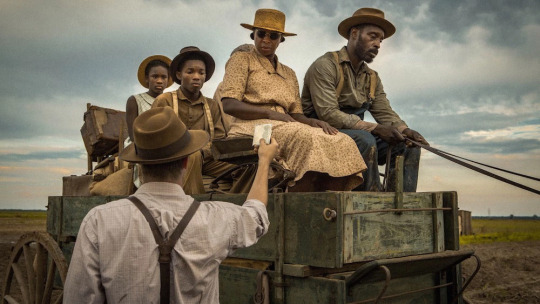
For the first 45 minutes this movie has an As I Lay Dying quality, where multiple narrators lay out the state of their moral and historical situations in portentous southern language that always sounds profound when done well, like it is here. It never gets quite that deep again, but it becomes a sober and accurate look at what this country, particularly the south, would have been for blacks, women, and even white men in the 1940s. Halfway through I started to wonder if any movie had ever shown how plain old fashioned American racism strips away the dignity of blacks and the humanity of whites as well as this one does. 12 Years a Slave, maybe, but even that one cheated a little bit by being a horror show. Also, Rob Morgan, who plays the paterfamilias of the black tenant farming family, especially finds the Faulkner in his character’s position. For my money he’s the breakout star here.
Icarus - Bryan Fogel
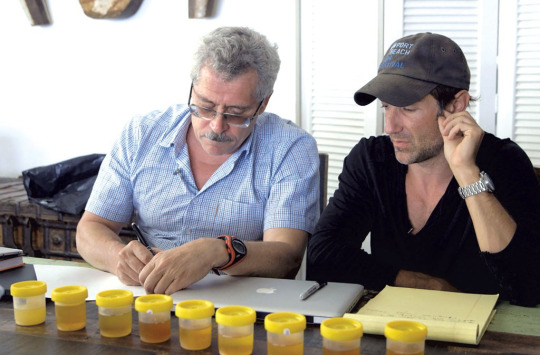
A problem I have found with certain documentaries that rely on their primary sources to tell their story is that the narrative can get blurry. This is a movie that would benefit from a narrator just to keep an eye on the spine of this fascinating true life event. The premise seems to be that a filmmaker stumbled completely by accident onto something so interesting that it obviously needed to take over his movie. Maybe a better filmmaker would have stepped back and asked some of the bigger questions presented by this narrative, like, why did this scientist seem compelled to run Putin’s national doping program? Maybe a master filmmaker would have dug into the heart of a man like Vladimir Putin who felt compelled to orchestrate a national doping program, a true story of global deception and malevolent corruption that deserves dozens of movies. But you’d have to be a walrus to not be intrigued by this guy, or eternally grateful that someone with a camera managed to catch him as his crime was discovered by the IOC and his government threw him under the bus and forced him into witness protection.
The Discovery - Charlie McDowell

I’ll get this out of the way first: the twist is not good. A squander of a pretty great concept that they could have anything with. But the rest of the movie is. The concept really is neat, and the whole thing looks great. This is a small, self-contained movie that chugs along at a heady pace. It’s a perfect Netflix movie, a genre I suspect we will all learn to recognize pretty soon.
Wonderstruck - Todd Haynes
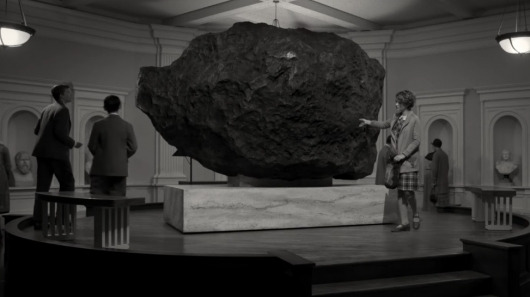
I’m Not There is a profoundly silly movie, but Carol was made by a consummate pro, so I’m inclined to like Todd Haynes, and trust him when he experiments by, say, making a silent movie that intersplices stories from two generations and shoots them to look contemporaneous to movies of their respective eras. Like The Shape of Water, there must be a wavelength that really gets this movie. Maybe one day I’ll give it another shot, but fuck it’s slow.
Good Time - Ben and Josh Safdie
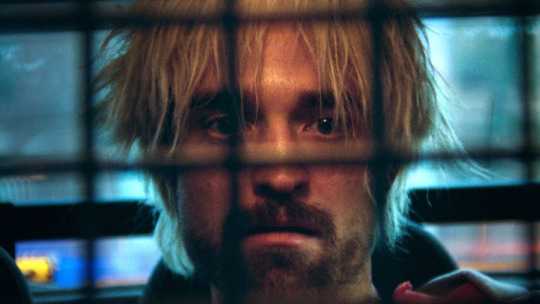
Woah. Let’s see here: This is a grim, ugly, unpretty neon movie about a side of New York that most people don’t like thinking about and will generally choose to ignore. It’s not just the poverty--there’s a darkness here, an ugliness and a savageness that’s usually examined sociologically if it’s examined at all. But this movie lives in it like it grew up in it, which for all I know it did. It’s about a white guy--and his skin color is very relevant--careening through Queens, ruining lives along the way in a single-minded quest to raise enough money to make his autistic brother’s bail. Mostly it’s so exciting and unpredictable that it flies by, telling a story about a guy with the survival skills of a cockroach getting through a night we might describe as eventful. And I need to give special mention to Jennifer Jason Leigh. She’s only in one scene, but she takes it to a dark, viscerally disturbing place. I don’t know that much about her as an actor, I don’t know what kind of work she usually does, but in a movie populated by characters I sincerely wish could have better lives, she will stand out in my mind for awhile.
Song to Song - Terrence Malick
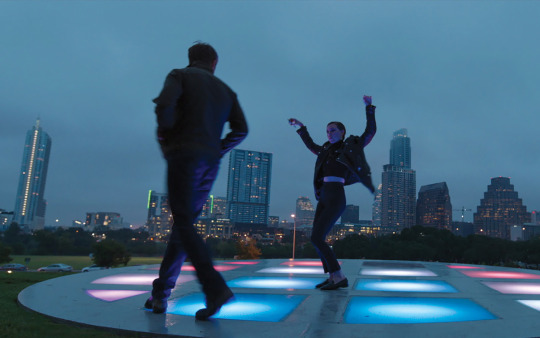
Part of me wants to like this movie, or at least respect it. Every shot is interesting--in fact that might be most of the point: every scene takes place in a visually arresting location, the actors do odd things with their bodies, the camera shoots them from weird angles. And I admire that Malick has mastered an impressionism that is uniquely his. But I also suspect that maybe this is just a bunch of bullshit from a guy who’s talented enough to make decently interesting work without trying very hard. I mean, he used to take 20 years to make his movies, now he’s pumping out one after another like he’s Woody Allen. And I think a movie can only have so much emotional resonance when the average scene lasts about 5 seconds. I don’t know, I can sort of see why a person might like this sort of thing, if a person was so inclined, but man did I think it was boring. If he’s just gonna make ponderous nonsense now, then at least The Tree of Life had the decency to be about the meaning of the universe.
Hostiles - Scott Cooper
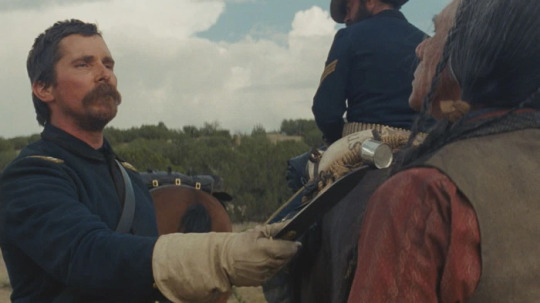
This is first and foremost a really solid western. Stoic and sharp and very well made. Christian Bale is amazing at this and should do one of these every couple of years. My only complaint is that it could have been better. It could have been a masterpiece. But it points to ideas about the inhospitality of the American frontier that it never really manages to show. People knocked the Revenant, but that movie really slaps you on the ass with how tough it was to hang in the old west. Hostiles wanted to do the same thing, but it settles instead on the simpler thesis that we stole this land from it’s rightful inhabitants. Which, I mean, fair enough I guess.
Molly’s Game - Aaron Sorkin
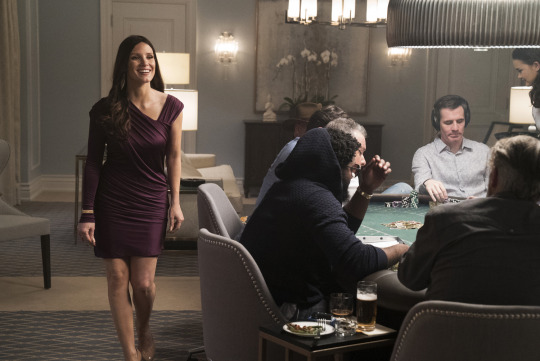
If Aaron Sorkin wants to write a novel and release it as an audiobook narrated by Jessica Chastain, guess what, I’ll listen, but he is not a director. This is a movie where the voice-over will voice over dialogue because good lord does he love to write, and a movie where the main character at her lowest point will narrate her depression over a shot of her in bed, because good lord does he not know how to show. So this movie loses something his screenplays don’t when they’re filmed by top shelf talents like David Fincher or Danny Boyle. But Sorkin is one of my favorite guys to write about because he’s so talented and also so flawed. He’s in love with academia, and with knowing things. I can’t imagine what he’s like to shoot the shit with, but I assume that the person he wants to be is the person he keeps writing--the hyper-literate Renaissance man (and now woman) with a top 99 percentile intellect and some kind of pathological drive. Lots of movies are about everymen, but neither you nor I will ever be a Sorkin protagonist. His doormen are wittier and better educated than we are. Anyway, his biggest flaw in my opinion, besides a tendency to get high on his own supply, which we might as well call a feature in this case, is his tipsy uncle sentimentality. But other than a scene at the end between Molly and her father, which is a cinematic crime against humanity, this movie mostly avoids that. It’s too busy being his most fun movie yet. Even more than Steve Jobs, which is where I learned to tear down my cynical walls and lean into his brand of goofy pop intellectualism. Here’s my take on this one: it will not stand up to repeat viewings. At all. Like, at all. But it made me want to get a job in finance just so I can start going to high stakes poker tournaments.
Kong: Skull Island - Jordan Vogt-Roberts

2017 was such a good year for movies that even bullshit like this was great. This movie pulls ideas whole cloth from the last Godzilla movie--here there’s also a benevolent monster god, a showdown between giant creatures over the soul of man, and almost contemptuously fantastic cinematography (because if something this corporate can look this good, than how much should we even value high priced photography?)--but it takes itself a fraction as seriously as that one did, and is by legions less stupid.
Call Me By Your Name - Luca Guadagnino

More movies should have stakes this low. There’s a lazy confidence here that I like a lot. This is how a movie about a 17 year old boy’s summer should feel. Nothing really matters, and every day is pretty good. Over the course of two hours he will swim, smoke, read, and fuck a boy, a girl, and a peach. He’ll grow up to become a gay man with a pretty normal and hopefully happy life. He’ll remember this summer very fondly.
Win It All - Joe Swanberg

If every movie were like this, movies would be a lot more boring. But I suppose there is a space out there for simple stories told simply. The best scenes are the ones with Keegan-Michael Key, who is so charismatic that he risks derailing the utter unexceptionalness that is this movie’s point.
A Ghost Story - David Lowery
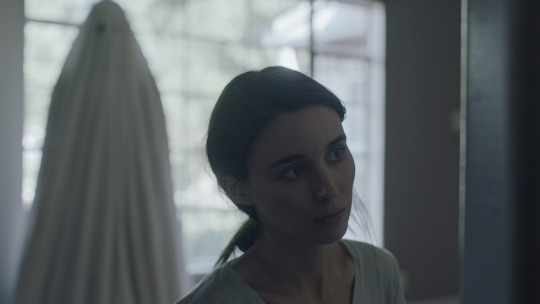
Does it seem gimmicky to make a movie about a dead husband as a guy in a white sheet with two eye holes cut out out like a child’s Halloween costume? I don’t know, the effect in practice to me was to make this celestial being look lonely and sad. He hangs his head in a silent longing and watches time hurdle through space from a fixed point he either can’t or won’t leave. This is a quiet, still movie; the kind that doesn’t cost much and is probably over-represented at film festivals. But it is, and forgive the sincerity here, devastatingly beautiful.
Phantom Thread - Paul Thomas Anderson

I wanted to give this a few more days to sink in before I wrote about it, but I’m nothing if not a content provider, so here we go. As the greatest artist of a generation ought to do, PTA upended my expectations about his style with this one, creating something new and challenging and not beholden to his previous work. His last couple movies have been about tension and release. This one really isn’t. Instead it’s a love story, or actually I mean it’s a relationship story, about the hunt for connection that all relationships become after the initial euphoria wears off. It’s still a Paul Thomas Anderson movie, so it’s haunting and strange and made up of tense dialogue that obfuscates it’s artistic intentions, spoken by strange people with unclear motivation. But it’s also funny, and mostly straightforward. It’s centered around a relationship, but this movie is as impossible to reduce as the last one, or the one before that. There are limits to my partisanship--there’s a dandyism to this movie that I don’t like at all, but this guy is consistently setting his sights up past the rafters, and throwing walk off touchdowns every single time.
I Love You, Daddy - Louis CK
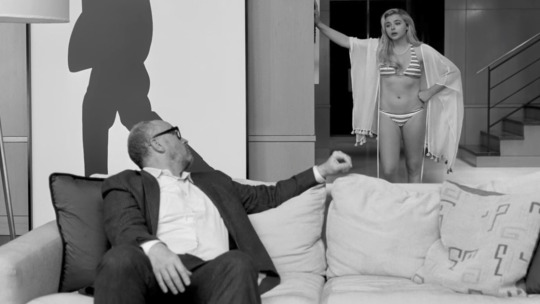
Louis CK’s disgrace is the only one I’ve had trouble reckoning with, because he’s the only person so far to go down who really had more to say. Unfortunately, if this ends up being his last project, it’ll have been a disappointing note to end on. Louis’ artistic problem is that he’s too hard on himself. Very often he will set up a disagreement between himself and another character and have the other character essentially school him, even if he’s not wrong. He has a tendency to shortchange his own point of view. But it’s never been detrimental to his work until now. This movie is essentially a professionally successful version of the pathetically passive guy Louis always plays getting chastised by a series of articulate women. The writing is very often great--he’ll probably never get his due now, but he’s the best writer of dialogue since Woody Allen--and it’s a little sunnier than his usual point of view allows for, but it’s less focused and less interesting than either of his two TV shows.
The Post - Steven Spielberg
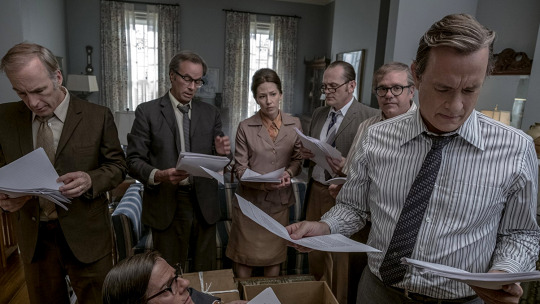
Like Bridge of Spies, this is a minor work from the master. The only bad thing I can say about this movie is that he’s not doing anything new, and the subject matter invites comparisons to more interesting movies, like Spotlight, and All the President’s Men, which would make a hell of a second billing here as a diptych about the rise of the Washington Post. Unlike Clint Eastwood, I believe Spielberg still has extra gears. He still has a few more home runs in him. But like Eastwood even his most workmanlike products are made with a level of casual mastery that makes them perennial top tenners. I don’t know that this movie was made for any reason other than to express a distaste for the current occupant of the White House. It still earned Meryl Streep another Oscar nomination.
It Comes at Night - Trey Edward Shults
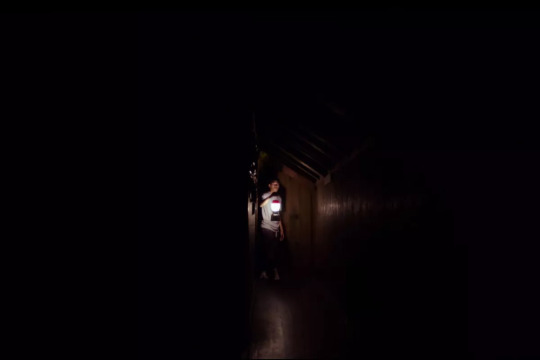
Why are all these low budget horror indies so good?
The House - Andrew Jay Cohen
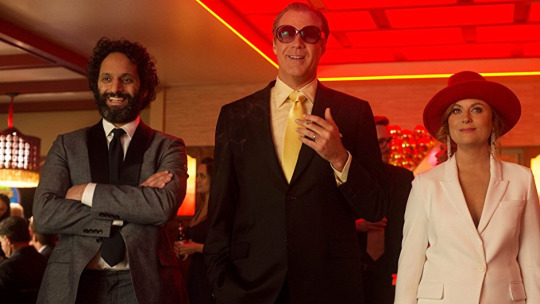
Will Ferrell movies have reached this weird place now where the concepts are funny but their executions aren’t. They’re coming up with good ideas but filming them straight because at this point they’re businessmen with schedules to keep. There’s none of the peripheral lawlessness that made up his earlier work, or makes up really any good comedy, especially in the Apatow era. This movie is only worth watching for two reasons: 1. it will pump you up if your on the way to the casino, and 2. evil Amy Poehler is so much better than civic do-gooder Amy Poehler.
Snatched - Jonathan Levine
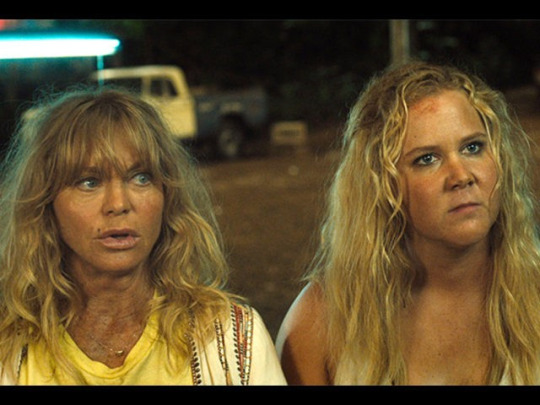
Is Amy Schumer the first comedian since Jerry Seinfeld who’s funnier in their scripted work than they are in their stand up? Anyway, until she starts phoning it in like elder statesman Will Ferrell, or is supplanted by someone newer, she’s my comedy protagonist of choice. Why did people take on a pass on this? Cuz the plotting is lazy? When isn’t it in a comedy?
Mark Felt: The Man Who Brought Down the White House - Peter Landesman
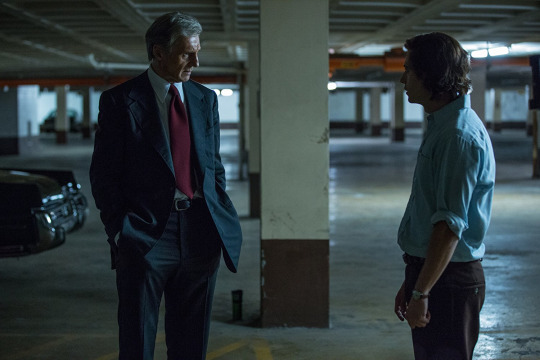
This movie is a huge mess but I refuse to not like it. It’s murky, paranoid, serious; in other words a great spy movie, about institutions of American government that dislike, distrust, and actively work to undermine one another. Nixon is barely even mentioned until the end, and the Washington Post is barely mentioned at all. But this should have been a miniseries or a novel. It’s a ten hour story condensed into two, and thus makes even less sense than a good spy movie ought to.
The Dark Tower - Nikolaj Arcel
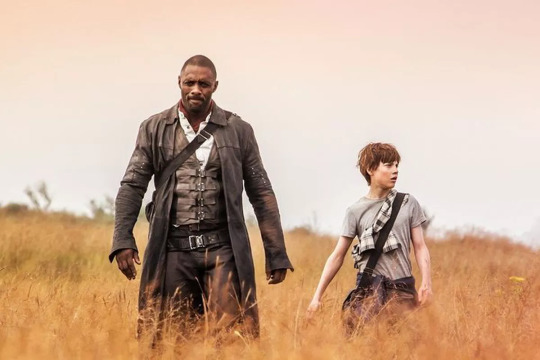
As someone who has not read the books and wasn’t even aware there was a cult behind them, I can say this is a perfectly enjoyable plane watch.
Battle of the Sexes - Jonathan Dayton and Valerie Faris
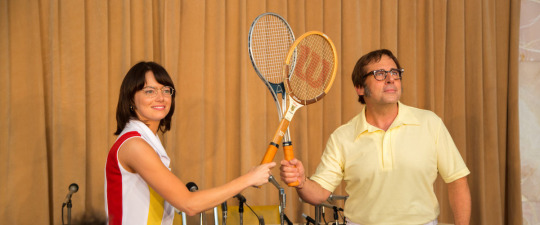
I suppose this is the safe and logical choice for the recent Oscar winner, and it’s not a bad movie by any stretch. The actual battle scene at the end is quite excellent. But ignoring the current political environment, a movie where a tennis prodigy discovers her sexuality and takes on a boy’s club is much less interesting to me than a movie about a hustler who’s past his prime, gambling with his buddies and turning himself into a heel. Steve Carrell plays it as a good natured ode to a dopey strand of American hustle. He’s the best thing in this. But of course that’s not why this movie got made. I guess I’m ultimately just a member of the boy’s club.
American Made - Doug Liman
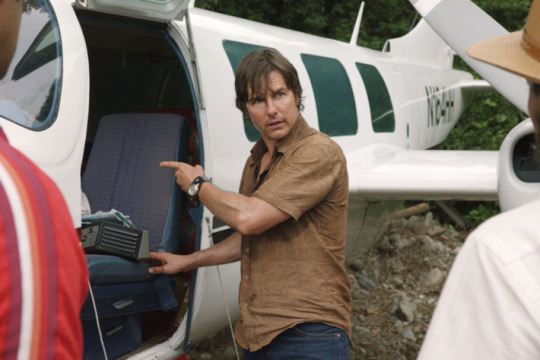
Speaking of American Hustle, this Goodfellas in planes strikes me as more Hustle with drugs, inasmuch as the ostensible good guys, the feds, are really just a bunch of selfish ambitious cowboys playing with house money. Where Bradley Cooper’s FBI agent was too stupid to realize how bad he was at his job, American Made’s Domhnall Gleason, who I understand is now in every movie, is some kind of CIA stud with no accountability and no budgetary restraints, coming up with increasingly outlandish ideas for which there are no consequences at all. When Tom Cruise starts working with Colombian drug cartels, the implication seems to be that everybody knows and nobody really cares. I’m not sure this movie makes any sense at all, or if it’s supposed to. It’s buoyed by movie star Tom Cruise at his movie star best, bringing a slight, slight maturity to his Top Gun self.
Star Wars: The Last Jedi - Rian Johnson
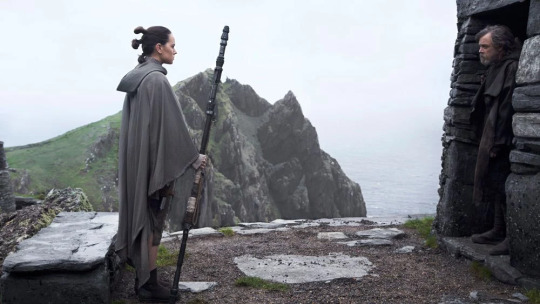
In The Force Awakens Adam Driver was the only good part of a bad movie. Now he’s the best part of a great movie.
The Lost City of Z - James Gray

The epic as a genre seems to me inherently flawed; who wants a movie that goes on too long and changes tone 7 times? This is an interesting one: it's first foray down the river comes with Apocalypse Now ambitions that it holds its own next to. The second trip is fun and captivating. The third trip, after extended scenes of World War One and, I don’t know, some family stuff, is too little too late. Basically, when this movie is in the jungle, it’s great. When it’s not, it’s not.
Lady Bird - Greta Gerwig

Let me stand apart from the glut of people my age who thought this movie was made specifically for them, and say that this movie was made specifically not for me. I can’t think of anything I want to see less than a coming of age tale called Lady Bird about a high school senior who decides to call herself “Lady Bird.” But the thing about good movies is that they transcend premise. Greta Gerwig isn’t dogmatically sticking to genre here--the dialogue is sharper than the average movie about an idiosyncratic high school senior, the parents and their financial situation occupy a more central role, and when the protagonist briefly tries to fit in with the cool kids, she kinda pulls it off--but really she’s just made a better coming of age movie than most people who try ever do. This is what we all would like to turn our childhood memories into. And for those concerned, like I was, by a trailer full of precious dialogue, the movie is so snappily edited that lines that would read as self-indulgent or treacly come out down and dirty in practice.
The Disaster Artist - James Franco
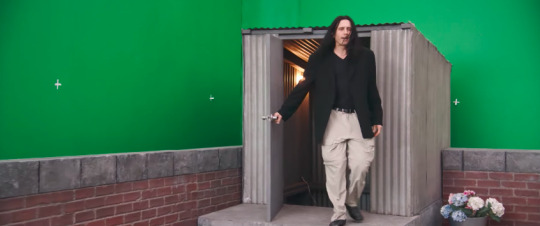
One of the impressive things about this movie is that it’s a comedy that doesn’t come at the expense of it’s subject: a man who in a slurred Slavic accent tells a room full of theater students “I’m not villain, you are villain!” A man who in other words could have an entire Office-style show built around him by a less charitable filmmaker. But James Franco is here to celebrate this bad movie, and honor the weirdo who made it. This isn’t the direction I would have gone in: I’d be too curious about the why and the who. But Franco does a really good job with his material. This is a really good and funny movie, with a murderer’s row of supporting actors who should all be doing stuff like this rather than whatever the fuck Seth Rogen is working on right now. Franco paints Tommy Wiseau as a pretty damaged guy with boundless ambition and absolutely no understanding of how human beings behave or how to interact with them--at one point he talks about wanting to run his own planet--but he keeps it light. Our man Tommy gets a standing ovation at the end, which I don’t believe really happened, but in this context I support.
I, Tonya - Craig Gillespie
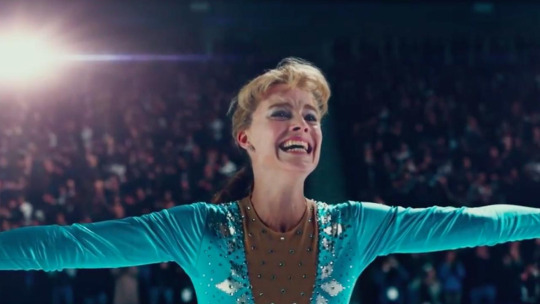
One thing about Tonya Harding is that if she were coming up now, in the era of Lavar Ball and Jezebel, she’d be uncontroversially loved, and never would have had to club anyone in the kneecap. As far as I’m concerned she’s owed a revisit, which this movie gives her, and makes her look sympathetic and talented and fundamentally decent, if a little unwilling to take responsibility for anything at all. Anyway it’s a pretty damn good movie. Not quite as wild as it’s masterpiece of a trailer suggests, but pretty fun and breezy the whole way through.
Jumanji: Welcome to the Jungle - Jake Kasdan

Nowadays, most theaters will let you bring alcohol into the screening. So here’s a fun game: go see comedies you have no interest in, and drink steadily throughout them. Preferably with others. I’m not being a dick here, I found this experience highly enjoyable.
The Shape of Water - Guillermo del Toro

Pan’s Labyrinth has earned Guillermo a ton of goodwill. And I mean, I caught part of Hellboy 2 on HBO the other night and that is a flick. This may be his next one-for-me, but it’s not Pan’s Cold War. The genius of his earlier masterpiece was that the descent into nightmare of its real life surroundings was mirrored by the descent into nightmare of its fairy tale. This is a pretty simple love story between a mute woman and a fish man, set during the Cold War. It’s a ripe premise and a ripe backdrop that Guillermo weirdly squanders. Any movie that casts as its villain Michael Shannon, the strangest and most intense man alive, and then makes him just another square 1950s Keepin’ up with the Joneses asshole, isn’t going to stand up to Pan’s Labyrinth. This movie is a love story between a mute woman and a fish man. It should be a whole lot weirder, is my point.
Logan - James Mangold

What this movie gets so right is rather than make super hero movies that could conceivably take place in our world, directors should make super hero movies that would take place if they were the real world. Hence the cursing, the ultraviolence, and the theme of consequence which hangs over Logan like a lampshade. Watching Wolverine and Professor X say “fuck” and brutally murder government agents feels like removing the sanitizing goggles that the older movies were shot through and seeing them for the first time as they really are. These are two badly broken people keeping each other alive. It’s also by happy accident a movie for the era of Trump, where a shitty present has the bad guys in the driver’s seat and forces everyone in the margins back into hiding. Patrick Stewart brings warmth and realism to a new version of an old role. This is the best super hero movie ever made.
Darkest Hour - Joe Wright

So Gary Oldman’s definitely going to win the Oscar here, right? It’s fine, he deserves it. I could have used more about who Winston Churchill was, why he was such an eccentric alcoholic, but as a portrait of a great man working through his defining moment this is a great movie. Between this and Lincoln I hope every new biopic is about the defining moment of a great person’s life. So much more interesting than biopics about great people.
Three Billboards Outside of Ebbing, Missouri - Martin McDonagh

At first I thought he was just making fun of American hillbillies. But if this isn’t his best movie, it’s definitely his deepest. Like a darker redneck Batman it’s main character lets a justified anger turn her into kind of a monster, and maybe gets redeemed at the end. It’s funny and entirely surprising. Sam Rockwell should get nominated.
The Big Sick - Michael Showalter
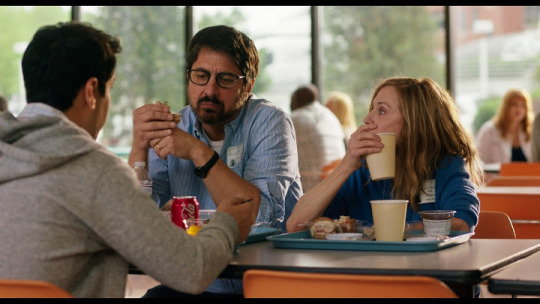
A movie about two saintly parents dealing with not only their comatose daughter, but an overgrown forty-year old child who’s rude to them yet refuses to leave them alone, and never has to face his own pathetic shortcomings because sometimes people are racist to him. Fuck this piece of shit movie.
Thor: Ragnarock - Taikki Waititi

Chris Hemsworth seems cool.
Last Flag Flying - Richard Linklater

Eh. I’m much less of a Linklater partisan than most, but this movie actually wasn’t that well received. It’s not bad, it just kinda meanders, and I actually don’t think Bryan Cranston or Steve Carrell are particularly good actors. It’s anger is righteous though, and Lawrence Fishburn is a titan.
Blade Runner 2049 - Denis Villeneuve
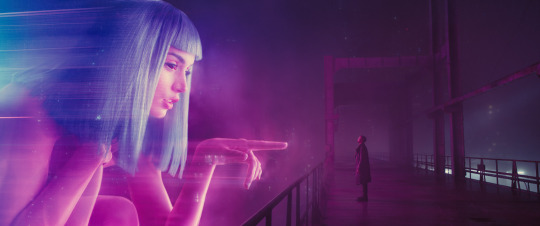
This one slows down a little once the plot kicks in, but holy god does it look good. A worthy heir to the original.
The Killing of a Sacred Deer - Yorgos Lanthimos
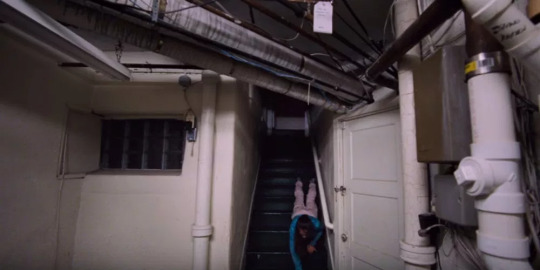
I think I figured it out--this guy likes to set up insane premises, force his characters to speak so flatly that it seems absurd, and then lift the gate and see how the ball rolls down the hill. Every character in this movie acts calm and rational and mostly human in the face of something so bizarre and terrifying as to defy logic. I like The Lobster more because I suspect it had more to say, but this one keeps you on a knife’s edge and forces you to prepare yourself for anything.
Wind River - Taylor Sheridan
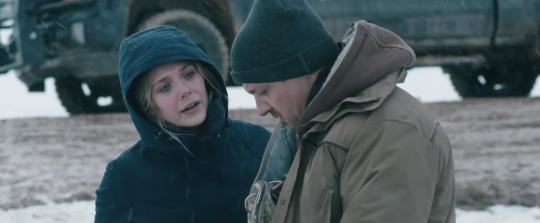
This is the third screenplay and first directorial effort from the guy who wrote Sicario and Hell or High Water, two of the best movies of the past few years. This is his worst movie. I suspect the culprit is novice direction. Despite this having a 501(c)4 title card at the end, for the first time I’m not sure what the point is or what he was trying to say. But I hold this guy to a high standard, it’s still pretty damn good. It looks great and the story’s good.
The Foreigner - Martin Campbell

This is a movie about Jackie Chan--still kicking ass in his 60s--avenging his dead daughter by boobytrapping a woods outside of a mansion, and another movie about a radical Irish politician and his cronies agitating for Irish independence, possibly through terrorism. Both of these movies should be awesome, although only one of them is. I don’t want to spoil by giving away the answer, but you can probably guess.
Marshall - Reginald Hudlin

A pretty simple courthouse movie about the future Supreme Court Justice when he was just a lawyer who apparently never spent a day in his life being intimidated by racism or the second smartest guy in the room. Sure, why not?
The Babysitter - McG
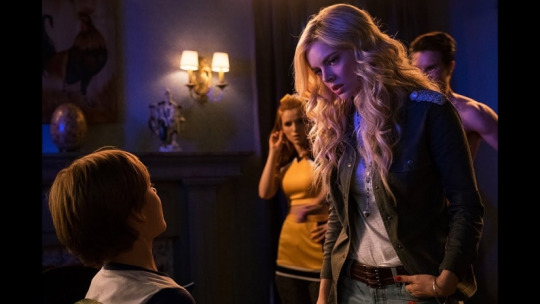
The second best horror/comedy of the year. My man McG is still killin’ it.
The Meyerowitz Stories (New and Selected) - Noah Baumbach

Noah Baumbach is a guy who likes a lot of stuff I don’t, but he’s enough of an adult here to write adults who don’t seem trapped in the imagination of a guy who hasn’t grown up yet. This is a really entertaining movie. Adam Sandler is very good.
It - Andres Muschietti

I’m a little surprised this didn’t take more flack for being the R-rated Stranger Things. This is also about a group of oddball friends dealing with something weird and scary in that sleepy town called 80′s Nostalgia. It even has one of the same damn actors. But maybe it didn’t take more heat for the simple reason that it’s really good. It might not hold up on repeated viewings the same way Stranger Things really doesn’t, but it’s the best horror/comedy of the year.
mother! - Darren Aronofsky
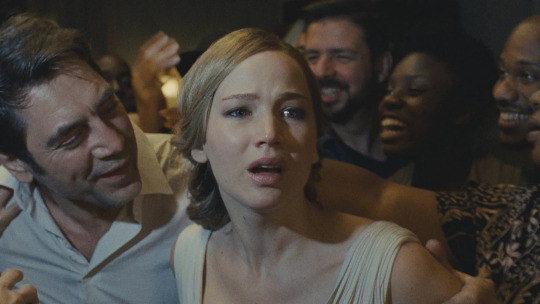
The more I think about it, the more I like it. I went back and watched some of his other movies, and concluded that Black Swan might be his masterpiece by default, but he’s never made something I really loved. He still hasn’t, but this might be his best movie yet. It’s about Adam and Eve, and it’s about mother earth, and it’s about a self-absorbed artist wrenching everything he can out of his muse. But it seems like Aronofsky is having fun screwing around with all these concepts rather than somehow trying to tie them all together or say something profound about any one of them. Which makes the movie a lot more fun than it’s reputation suggests. In any case, my immediate take walking out of the theater was that it more than anything was about some poor guy who gave up everything he had just to write a damn poem.
Logan Lucky - Steven Soderbergh
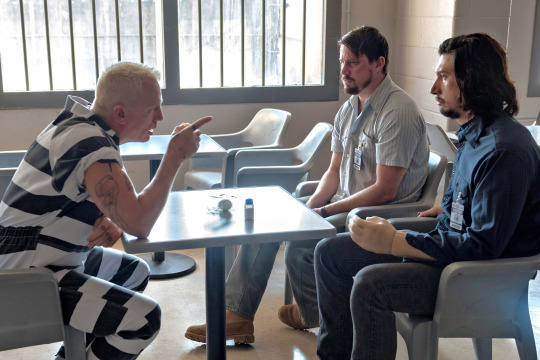
This one didn’t do nearly as well as I thought it would, which might have more to do with its distribution model than anything else. Ocean’s 11 for hillbillies couldn’t be more accurate, but it’s not criticism. At least not coming from me. First of all, Ocean’s 11 is like the perfect movie. Second of all, I mostly love redneck culture. Adam Driver has an amazing ability to land roles that shortchange him and make great work out of them anyway. And every real man knows Channing Tatum is a better star than George Clooney.
Dunkirk - Christopher Nolan

Chris Nolan isn’t any good at telling stories, and anyway doesn’t seem to like doing it, so it’s no mystery why his best movie bags the plot completely. Even with it’s time looping gimmick premise this movie takes place entirely in real time, in the present, which is, it turns out, by far the best way to shoot a war movie. It’s hard to imagine something better coming out this year.
Baby Driver - Edgar Wright
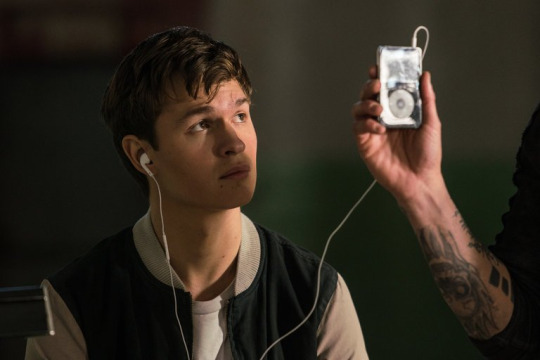
The best music video ever made. Pour one out for Kevin Spacey.
Wonder Woman - Patty Jenkins

I resist these pieces of shit like Roy Moore resists girls who can buy their own alcohol, but every year I end up seeing one or two. This is probably the best case scenario for a DC comic book movie in 2017. Gal Gadot is a very pretty lady. This coulda been a good WWI movie.
Norman: The Moderate Rise and Tragic Fall of a New York Fixer - Joseph Cedar
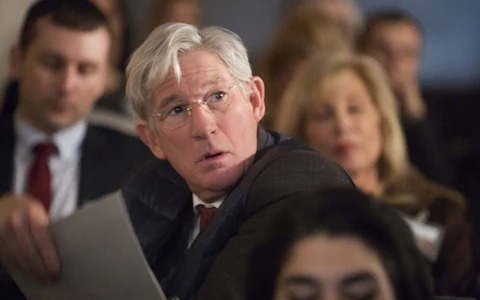
Richard Gere plays a possibly homeless and mostly benevolent conman who befriends an Israeli bureaucrat and sees his fortune briefly change when said bureaucrat stumbles into the Prime Minister position. I walked into this one completely blind because it was March and I wanted to see a movie. I might be the only person outside of Israel who’s ever seen it. Which is unfortunate, because it’s better than a movie dumped out in March has any right to be. Kinda funny and kinda sad. Kinda satirical and very warm.
Get Out - Jordan Peele
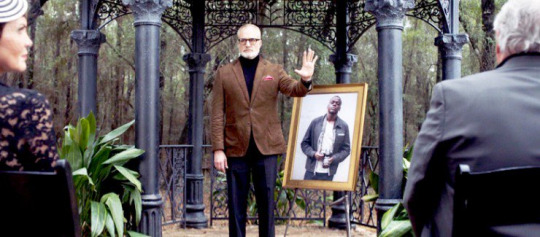
Of course it’s a little overrated at this point. How could it not be? But the first hour of Jordan Peele’s cultural explosion is perfect--a breakdown of every awkward moment between black people and--let’s be honest--all white people. The second half is less deep and a little less fun: it’s when the social commentary flick turns into a genre film. But it’s a damn good genre film. Deservedly on everyone’s top ten list.
A Cure For Wellness - Gore Verbinski

I caught this one of the strength of it’s trailer and thought it was excellent, a creepy kind of horror movie that not enough people saw, about a health clinic that either prolongs or sucks the life out of rich retirees. Kind of a Shutter Island for a crowd less inclined to have its mind fucked.
0 notes